
Garmin’s new Instinct 2X aims to complete the threesome size lineup of the Instinct 2 series, offering now a small, medium, and large edition. However, most notably, it becomes the next series of watches to include the flashlight, which Garmin launched on the Fenix 7X last year. This flashlight has multiple modes, including strobe and red-light mode. But beyond that, and most critically for those wanting higher accuracy, the Instinct 2X also includes multiband/dual frequency GNSS/GPS. Oh, and it gets Training Readiness!
In effect, the Instinct 2X follows in the footsteps of Garmin’s Fenix X variants. From the first Fenix X variant back on the Fenix 5X, Garmin used the larger size unit to ‘introduce’ new features to the market. A blend of market interest validation tests (do people find this new feature useful?), with charging a premium for said fancier features. The company is now applying that same concept here with the Instinct 2X, albeit by taking already existing features from higher-end units.
In any case, I’ve been testing the Instinct 2X for quite some time now. Putting it through more paces than I can shake a stick at. Swims, rides, runs, hikes, trail runs, gym, and whatever else floated my boat (except, I don’t have a boat). As usual, I’ll dive into what works well, and what needs more work – there’s a helping of both in this unit.
Garmin sent over media loaners to test out. As usual, this review is not sponsored (nor does any company get to preview anything I review), and I don’t take any advertiser money from any companies I review. Once this unit goes back, I’ll go out and buy my own for any future testing needs. If you found this review useful, you can use the links at the bottom, or consider becoming a DCR Supporter which makes the site ad-free, while also getting access to a mostly weekly video series behind the scenes of the DCR Cave. And, of course, it makes you awesome.
What’s Changed:
At first glance, you might assume this is just a slightly bigger Instinct 2. But in reality, that’d be woefully wrong. In fact, it’s probably best described as an Instinct 2.5X – meaning, it’s not quite hitting the bar for a someday Instinct 3, but it’s a far better unit than the Instinct 2 series. This is common in Garmin land, and in fact when Garmin first introduced the Instinct 1 units they didn’t have solar. That was followed up nearly 2 years later with an Instinct 1 Solar series that had significantly revamped internals – just like this.
In any case, here’s how it differs from the Instinct 2 series – and, how similar it’s become to the Fenix 7 series:
– Increased watch size to a 50mm case (previous Instinct 2S is 40mm and Instinct 2 is 45mm)
– Increased display size from 0.9” to 1.1”
– Increased solar panels by 50% compared to Instinct 2 Solar
– Massively increased battery claims/specifications (see battery chart)
– Added screws to front case
– Added multiband/dual-frequency GPS/GNSS
– Added flashlight/torch, both white and red light, plus strobe options (like Fenix 7X or Enduro 2 series)
– Added Training Readiness suite of metrics (like Fenix 7 series)
– Added solar lux hour tracking metric (like Fenix 7 series)
– Added Morning Report (like other Garmin watches)
– Adding obstacle course racing activity profile in near-term update (like Fenix 7 series, also now in Instinct 2 public beta)
– Adding Boxing and MMA Activity Profiles in the next quarterly update
– Price actually stays the same at $449 (compared to existing Instinct 2 Solar units)
There is no non-solar variant of the Instinct 2X, all Instinct 2X variants are solar-enabled. There is however a Tactical Instinct 2X edition, costing $50 more at $499, which also includes a green flashlight (instead of red).
Ultimately, that leaves Garmin with three core Instinct sizes, as shown below side by side – the Instinct 2S (40mm), the Instinct 2 (45mm), and the Instinct 2X (50mm)– identical in concept to Garmin’s Fenix naming for those three sizes. Here’s a shot next to the smaller Instinct 2 (I can’t find my 2S at the moment):
Got all that? Good, let’s get started.
The Basics:
This section will be a quick overview of the basics of the watch, none of which has changed since the previous Instinct iterations.
The first thing to know is that it’s all-button navigation, no touchscreen here. You’ve got three buttons on the left side, and two on the right side:
Meanwhile, on the back, you’ve got the optical heart rate sensor, which contributes not just heart rate information, but also data on things like breathing rate, PulseOx, and plenty more:
The straps are removable, in the event you need/want to replace it. Simply grab a paperclip and then insert it into the side, and it’ll pop out. Outside of that, it’s pretty darn secure, if a bit overly built. But that’s sorta the Instinct 2 series design goal.
Next, you’ve got the watch face. This is fully customizable, both on the watch itself, as well as via downloading from Garmin Connect IQ, Garmin’s app store. Each of the complications (data bits) are tweakable as well.
From there, you’ll scroll down to the widget glances. Each piece here is a different and customizable tidbit of information. These can be steps, the barometer, training status, and anything else you want.
You can open up any of these data tidbits to see full stats, usually in 2-3 different pages, such as steps here, and steps over the past week (it’s been a bike-heavy week):
The watch will track sleep as well, automatically, including when you don’t sleep very much at all. All of this contributes to data metrics like Training Readiness, as well as the sleep score. It’ll track sleep phases, but I don’t put too much trust in that.
Of course, all of this information is also accessible via Garmin Connect Mobile, and Garmin Connect as a platform as well:
And like most smartwatches, you can also see notifications here – including emojis. You can’t respond/answer from the Instinct series from iOS (but can via canned responses on Android), but you can clear/open/dismiss them on iOS.
As I said earlier though, all of this stuff is the same as before with past Instinct devices. Instead, the new goodness on the Instinct 2X is actually in other areas, so let’s jump into those.
Sports Usage:
Arguably, the main reason you’d get the Instinct 2X is for outdoor and sports usage. The sport modes are where you track activities, be it a hike, run, ride, ocean swim, or any number of the umpteen other sports that the Instinct 2 series tracks. This can be sports using GPS (generally outdoors), as well as non-GPS sports such as a pool swim or gym workout. Those sports instead leverage internal accelerometers and other sensors.
When the Instinct 2 series initially launched a year ago, it dramatically expanded the sport profiles, including sports like triathlon/multisport, as well as a slate of cycling-related ones. Since then, we’ve seen additional sports modes added (like Running Track mode), and with the Instinct 2X, it also will soon gain an Obstacle Racing sports profile, Boxing, and MMA profiles. Here’s a complete list of all the sports modes on the Instinct 2X at this time:
Bike Indoor, Run, Bike, Treadmill, Navigate, Expedition, Track Me, Project Waypoint, Area Calculation, Pulse Ox, Multisport, Trail Run, Virtual Run, Track Run Indoor Track, Walk, Hike, Climb, MTB, eBike, eMTB, Cyclocross, Gravel Bike, Bike Commute, Bike Tour, Road Bike, Pool Swim, Open Water, Triathlon, Swimrun, Ski, Snowboard, Climb Indoor, Bouldering, XC Classic Ski, XC Skate Ski, Backcountry Ski, Backcountry Snowboard, Kayak, SUP, Surf, Kiteboard, Windsurf, Row, Row Indoors, Strength, Cardio, HIIT, Yoga, Elliptical, Stair Stepper, Floor Climb, Tactical, Boat, Tides, Fish, Hunt, Golf, Tennis, Pickleball, Padel, Horseback, Pilates, Health Snapshot, Other
Once you’re ready to suffer, you’ll tap the upper right button, which will show your preferred/favorite sports first, and then from there you can add other sports or customize the list.
Speaking of customization, all of this is customizable on the watch itself, or via Garmin Connect Mobile (smartphone app). That was added when the Instinct 2 series launched, and allows you to tweak basically everything from your phone. You can customize and configure everything from the exact sport profiles you use, to which metrics are shown on the data pages. Further, you can even configure almost all watch-wide settings like GPS satellite modes (including multiband/dual-frequency), alerts, and more.
About the only thing you can’t really tweak from the smartphone app are 3rd party paired sensors like a power meter, cadence sensor, or such. But you can modify internal sensors such as the compass/barometer/etc…
Speaking of sensors, the Instinct 2 series significantly expanded the slate of supported connected sensor types. These can be accessed within the Sensors & Accessories menu, and include the following types (both ANT+ & Bluetooth Smart supported, depending on the exact sensor type):
External Heart Rate, Speed/Cadence, Power, Foot Pod, VIRB, Tempe, RD Pod, Cycling Lights, Cycling Radar, Extended Display, XERO Laser Locations, inReach, DogTrack, Smart Trainer, Club Sensors
This is all in addition to the internal compass, barometer, altimeter, and optical HR/PulseOx sensor. Note that there is no ECG support within the Instinct 2 series. While Garmin recently launched that on the Garmin Venu 2 Plus watches, it hasn’t made its way to any Outdoor product division units yet (and requires different hardware not in the Instinct 2 series).
For 3rd party sensors though, you can pair and configure sensors, such as tweaking the crank length on power meters. Further, you can save multiple sensors of any given type, as well as enable/disable as you see fit.
While I’ve had generally good luck here, I have been having issues specifically with the new Stages LR dual-sided power meter and the Instinct 2X. Simply put, it constantly drops out and won’t calibrate much of the time. No other Garmin watch/device has this issue with the Stages LR, and to Garmin’s credit, their engineering team has been trying to nail it down for weeks now with tons of logging and debugging to find the root cause. That might be easier once the Instinct 2X announces today, as they can also involve Stages as well in that troubleshooting. I’ll update this section accordingly if/when it’s fixed.
For cycling power meters that support Cycling Dynamics, it’ll record that data for later viewing, such as seated/standing time or pedal center offset. Currently, that’d be Garmin Vector/Rally pedals, and then Favero Assioma supports a subset of cycling dynamics. It also supports Running Dynamics with a compatible sensor. However, at this point, it does not do native wrist-based running dynamics like the just released Garmin Forerunner 265 does. Hopefully that changes. It does however do wrist-based running power.
In any case, having picked a workout, if running/cycling, it’ll offer a Suggested Daily Workout. This will either be part of a specific automated training plan towards a race/goal you’ve set, or just something that it thinks will keep you fit. You can disable this if you want. Also, if you had poor/bad sleep the night before, it’ll simply suggest a rest day:
Further, you can download 3rd party workouts from platforms like TrainingPeaks, TrainerRoad, or even Garmin Connect itself. All of that is like any other Garmin device.
At this point you can also add a course/route, but I cover that in the ‘Navigation & Routing’ section down below.
Instead, let’s hit the start button and start recording. You’ll see your data pages and data fields as configured:
Speaking of which, the Instinct 2X supports up to 5 data fields per page, and more data pages than I could possibly need/create/configure.
Further, you can also configure things like auto lap, auto pause, auto climb, and even 3D distance and speed for super-steep climbs/descents. There is no ClimbPro on the Instinct 2 series unfortunately, that’s reserved for Garmin’s higher-end/higher-priced units. Though, these days with the Garmin Forerunner 955 being $499, it’s a bit hard to reconcile that having it, yet the Garmin Instinct 2X Tactical Edition not having it (also $499). Such is the splatter approach to features within the Garmin lineup.
In terms of things like GPS pace stability, while running, I didn’t have any issues with that during any of my workouts. Nor did I have issues doing structured workouts with it, of which I’ve done many over the last few months (usually created in Garmin Connect, but sometimes sent from TrainerRoad). And you can also see native wrist-based running power here too:
And for aquatic adventures in the pool, I had no problems with lap accuracy, being spot-on every single time (for freestyle, I’d look like a drowning polar bear for any other swim stroke).
Once you’ve completed your workout, you’ll get a complete summary of all the stats – more than you can shake a stick at. And the same is viewable on Garmin Connect Mobile too:
All of these are then sent to Garmin Connect (the platform) via Bluetooth on your phone, or via USB on your computer. There is no WiFi here. From there, they’ll be sent onwards to 3rd party platforms like Strava, TrainingPeaks, Today’s Plan, and countless others.
Now, a big new feature on the Instinct 2X units is Training Readiness. This first rolled out on the Forerunner 955 last summer, and has since become common on Garmin’s $350+ devices (including the Forerunner 265)…except the Garmin Venu 2 and Instinct 2 series units. However, the Instinct 2X solves that, gaining Training Readiness.
Essentially, Training Readiness is part of a suite of training metrics, of which there are a number of components – but the big ticket one here is Training Readiness itself:
Training Readiness: This metric aims to be your one-stop shop to decide whether or not to train that day. It blends Sleep (vs both short and long-term history), Recovery Time, HRV Status, Acute Load, and Stress. In short, you can spike one category (badly) without necessarily killing your next training day. But all categories aren’t created equal.
Training Status: This is looking at your acute load, HRV status, load focus, and VO2Max trends. This one is less about should you train, and more about how you’re training. Meaning, are you doing too much high intensity, or too much low intensity? That’s what’ll give you an unproductive status. In other words, how would a coach look at your training log, ignoring most other life/feeling type metrics.
HRV Status: This is measuring your HRV values constantly while you sleep, and then comparing it against your 3-week baseline, up to a 90-day rolling window baseline. A single night of drinking doesn’t tank this score, but three nights of partying won’t keep you in the green.
Acute Load: This is looking at your last 7 days of load, except the load now burns off dynamically. Meaning, a hard training day 7 days ago is far less impactful to the score than a hard training day yesterday. Previously this was called 7-Day Load, now it’s Acute Load.
Recovery Time: This calculates how much time you need till your next hard-intensity workout. As is often misconstrued, this isn’t till your next workout, just your next hard one. This is largely the same as before. Exceptionally good sleep can speed this up, and inversely, a high-stress day can slow this down.
The idea with Training Readiness is to take a bunch of components under one umbrella, and figure out how ‘ready’ you are to ‘train’ at that very second in the day. The value will shift throughout the day (higher if you do nothing, lower if you do a workout). The score is comprised of all the fellows you’ve seen before: Sleep, Recovery Time, HRV Status, Acute Load, Sleep History, and Stress History:
Each of the components are weighted in varying ways, and against varying timeframes. Here’s the run-down:
– Sleep: This one is specifically looking at last night’s sleep
– Recovery time: This looks at your Recovery time in hours (based on workouts, but can be sped-up with good recovery)
– HRV Status: This is comparing your 7-day trend versus historical trend
– Acute Load: This is looking at your 7-day trend, weighted towards newness
– Sleep History: This is looking at last night versus your prior 2 nights of sleep history
– Stress History: This is looking at the recent daytime data (excluding overnight readings)
Again, the premise here is that you can figure out what’s impacting your training readiness, and whether it’s expected. If you’re at a training camp, you’ll expect high Acute Load and likely high recovery time too. But hopefully, the other stats are normal/good. Thus, you can try and figure out whether to proceed or not. Whereas if everything is looking like a red dumpster fire, then you should probably train on the couch.
Now outside of sleep, the one I tend to look at the most is Acute Load. At first glance, you might think this is just 7-day Load renamed, but that doesn’t really cover what it actually does. Yes, it shows your 7-day load, but load burns off dynamically. In years past, if you had a big ride 6 days ago, that load would be factored into your total 7-day load duration as if it just happened yesterday. Versus with Acute Load, it’s weighted to burn-off within a few days, as logical. That’s because a week later it’s unlikely that big ride is still impacting you. The point of this is to reduce the massive swings that used to occur in the Training Status panel when a big workout from a week ago disappears, making you go instantly from Productive to Unproductive in a matter of seconds.
Here’s my acute load, and you can see how last week was very high, and now the last few days have been a bit of recovery (and churning out product reviews):
Next, there’s Training Status 2.0. This has three core components of VO2Max, HRV, and Acute Load. In my case, my VO2Max value has been ‘stuck’ since last November, despite massive increases in training volume, speed, FTP, predicated race paces, and any other metrics you want to use. Literally every component of the Garmin training ecosystem says I’ve gotten dramatically faster in the last 4 months of heavy training. Yet, because my VO2Max is stuck oddly low, Training Status basically just stays stuck on ‘Maintaining’. At this point, something seems to be wrong – either with it detecting updates to that value, or the concept that Vo2Max should always be ‘climbing’ (because obviously, it can’t climb forever).
Here you can see the HRV status component, also viewable on Garmin Connect:
Now, one last area to mention is Recovery Time. This largely hasn’t changed from before, but I need to briefly highlight it, because it’s now far more important in the Training Readiness score. Recovery time is showing your recovery time based on workouts. This is basically showing your recovery time till your next hard workout, in hours. This can speed up with a good night’s sleep, or slow down with crappy sleep or a very stressful day:
Ultimately, I still find Training Readiness to be one of the most useful metrics Garmin has created, and it does a pretty good job of taking all the components together and making sense of them – as well as being reactive to sudden events like lack of sleep. I’m glad to see they included it here, but bummed to hear it won’t be coming to the rest of the Instinct 2 series (given it’s the same price).
Navigation & Routing:
The Instinct series has long been regarded as the mini-me of its more expensive Fenix sibling. In some ways that’s true, and in others it falls far short. Still, for short treks, it can get you to the location and back out in a pinch. However, this is actually the one area that I think the Instinct series desperately needs attention to be competitive or usable for people doing anything other than a morning day hike.
To begin, the Instinct series doesn’t have onboard maps, and that’s totally fine as it lets them save battery life. Instead, it has so-called breadcrumb trail routing. This has been around for 15-20 years, and means you simply follow a small course outline for your activity. The good news is that, unlike decades ago, you don’t have to use a bunch of cumbersome tools to plan your routes.
Instead, you can use all the normal platforms you’d expect today from Strava Routes to Komoot, or Garmin Connect itself. There’s no need for 3rd party apps here. I’ve been using the unit in planned route workouts/treks since earlier this winter, for hiking/running/cycling – but to simplify things and explanations, I’m going to focus on one specific recent hike. This hike was planned as an approximately 25KM/15mi hike on the Spanish island of Mallorca. It’d go up a mountain, back down to the sea, then back up again over the top of a different peak before heading out to the end of the peninsula and back along another other bay. Here’s the route created in Strava:
This then pushes to Garmin Connect automatically, and from there instantly synced to the Instinct 2X. All of which works well and efficiently. Had I wanted to tweak things in Garmin Connect I could do so, but in this case I just left it as is, and loaded it up on the Instinct 2X, by going into the courses menu:
From here I selected my specific course:
You can open up an elevation profile, as well as a map of the track:
Then you can tap to ‘Do Course’, at which point it thinks for a while and produces an error:
And here’s the rub: The Instinct 2 series has a maximum track limit of 50 “points”. What defines a point you ask? Well, that’s a very fuzzy answer. It’s a combination of lots of things, none of which enable you to mitigate it. For example, it’s not actually a ‘turn’ in the course, nor is it points you selected on the map. Nor is it distance-based, or surface-based (e.g., road vs. trail). In fact, it’ll differ depending on the very platform the course was built on.
So, in this case, you can see that 66 of my points were discarded. This means that while it’ll continue showing me the trail the entire route, it’ll stop notifying me of turns after about less than half of it (a mere 25KM/15mi hike, so only about 6 miles worth!).
Garmin’s higher-end units have substantially higher limits here, and most other companies have no limits at all. What this means is that basically, any route over roughly 10 miles/15KM will tend to fail. I’ve tried mind-numbingly straight paved-road routes here in the Netherlands that fail well below 20 miles, as well as more complex 200KM routes that fail on basically the first few hours of the hike. This fundamentally shouldn’t be an issue in 2023. Period. This is purely a software design issue that should have been addressed years ago.
In any event, my anger at this aside, as you’re out on the trail, you’ll see the breadcrumb trail of where you’re going on a ‘map’.
If on other data pages, as you approach any turns/deviations in the course, it’ll pop-up a small overlay counting down to the turn, and the direction. It won’t list anything like “Turn left on Maple Trail”, like Garmin’s Fenix/Forerunner series would, as it just doesn’t have that level of data/context.
In my case on my hike, it did this just fine, chirping at intersections and letting me sort out which direction to go by looking at the breadcrumb trail. Obviously, this is where the maps of the Fenix/Epix/Forerunner series are useful, as on-map features like lakes/rivers/etc make it quicker to identify which direction to go, but overall, the breadcrumb is fine. If you go the wrong way, you’ll get an off-course warning within about 50 meters anyway.
And this is sorta Garmin’s “out” on this whole max-point mess: Even if it doesn’t continue telling you when to turn, you’ll still get alerted if you meander off-course. Likewise, you’ll always still see the course, and even see the upcoming elevation profile – as well as distance remaining:
By the half-way point on my course, I’d lost turn notifications and the noise associated with it. But that’s fine, I just talked to a mountain goat instead:
Now, later in the course I ran into an unexpected military checkpoint that prevented further navigation. At this point, I could end the course (without stopping my tracking), or hope it’d latch onto the return route. I could also route directly to my starting point (as the crow flies), if I needed to. In fact, you can also navigate directly to a specific GPS coordinate (in a variety of GPS coordinate types/formats), as well as use the compass to navigate.
Further, you can ‘TracBack’ if you need to, which simply follows the path you took, back to the starting point. And, if you had saved specific locations on the watch, you can navigate to those too. Again, all of this is ‘as the crow flies’. However, if you were out in the wilderness and did have your phone with the Garmin Explore app installed, you can create routes on the fly that aren’t crow-like. The Garmin Explore app is different than the Garmin Connect app, and designed specifically for totally offline usage. You’ll need to download maps ahead of time to it, but, it’s handy to stash it on your phone in case you need it some day.
Finally, for lack of anywhere else to stick it, you’ve always got access to ABC functions via the ABC widget (altimeter, barometer, compass), by just tapping down a bunch (you may have to add it to the widget roll if you haven’t yet):
Note that you can also have just a dedicated widget for each of those three functions too. This will use the unit’s magnetic compass and barometric altimeter. And when you open up this widget, you get four data pages. The first is all three data points in one:
Then you’ve got a chart of the altimeter information. You can calibrate the altimeter here, choose whether to auto-calibrate, as well as whether to display the data in meters or feet.
Followed by the barometric pressure details. You can calibrate this, as well as change the plot type to 6hr/12hr/24hr/48hr. You can also change the sensor modes, storm alert options, and how it displays pressure.
Followed then by the compass. The compass also has calibration options, as well as the ability to change the mode, for example, from the display (degrees or mils), to how it displays North (true, magnetic, grid, user);
With all that set, let’s take a look at the Solar and Flashlight features, and then GPS, Heart Rate, and Elevation Accuracy.
Solar Features:
Out of the big hardware upgrades to the Instinct 2X, the significantly increased solar panel is definitely notable. Solar has been around on the Instinct series nearly since the beginning of Garmin’s solar days. While solar on devices like the just-released Edge 540 & 840 are ‘interesting’, the reality is solar on those devices contributes very little to the battery of the device. The same is mostly true on the Fenix lineup too. However, with the Instinct series, due to the significantly lower battery drain profile, solar actually makes a massive difference. Taking the battery chart from ‘days’ to ‘unlimited’ in certain categories.
The Instinct 2 series solar subsystem saw an increase in efficiency of the panels themselves, as well as the efficiency of the power draw of the watch (compared to the Instinct 1). In terms of how Garmin solar works, there’s two different solar panels at play on most devices:
A) The ‘empty’ space around the edges of the display. This semi-blocky area is used for solar panels, and is easily seen
B) The entire area atop the display but below the plastic layer, this is essentially invisible to you
Looking at the edge area first, if you look directly at the watch (not on angle), this mostly disappears. However, when viewing at an angle you’ll see the solar panels easily. This area can collect 100% of the sun’s rays. Well, technically it’s of course less than that, but in terms of simple relativity here, we’ll go with that being 100% from a Garmin spec standpoint.
Then, there’s the whole chunk atop the display – basically atop the words/text/numbers, and such. This area doesn’t gather as much solar goodness, only 10% of the sun’s rays. This is because if it were 100% you wouldn’t be able to see the screen. Whereas at 10%, it’s basically invisible to you and doesn’t impact clarity.
With the Instinct 2X Solar, you’ll see that solar contribution in a number of places, but now with additional specifics not seen on the Instinct 2 series. First, on the watch face you’ll see a small widget in the upper left/top edge. You can customize whether or not to show this of course, but by default it’s there showing the solar intensity over the past few hours. Also, you’ll see the total lux hours now displayed above that (244k above), whereas Garmin says the Instinct 2 series didn’t have the right hardware to display that (you’ll see this on the Fenix 7 too).
From there, if you scroll down once, by default you’ll see the Solar Intensity widget glance, showing the last 6 hours of Solar activity. If you stop on that widget without opening it, you’ll see a sun icon divided up into 10 blocks. Each block represents 10% intensity. So basically more is better, meaning the sun is brighter. On a cloudy day you might only get one or two blocks (if that). Whereas full sun at the beach in summer will light up not just the 10 blocks but the center sun as well:
And if you crack open the widget, you’ll see a larger version of that same intensity levels graph – now with the added Lux Hours up top:
And pressing down once shows the Solar intensity levels seen on your watch over the past 7 days:
You can also see this data within Garmin Connect Mobile, historically, via the ‘Devices’ menu’, for historical reference.
Now, just to put things in perspective, here’s the battery chart for the Instinct 2X (and other units). Certainly, the unit has a bigger battery to begin with, but it also fills out the ‘unlimited’ checkbox in more categories.
Garmin says the easiest way to think about it is that if you get 3-hours in 50K lux conditions, it’ll get you 1 hour of GPS time or 1 day of smartwatch/standby time. For context, 50K is semi-sunny weather, but not crazy summer sun at the beach time sun. You can find 50K sun in the winter without issue. Of course, that does mean you’re finding sun – if you live in a place that doesn’t see the sun, this won’t help you.
Ok, so specs aside, what does battery burn look like? Well, let’s take a look at a hike as an example. This hike was in mostly full sun conditions in Mallorca, without much (if any) tree cover. Here’s the battery burn profile of the Instinct 2X, where navigation was enabled, multi-band was enabled, phone connectivity/LiveTrack was enabled, as well as the optical HR sensor:
And then for fun, here’s another battery burn chart, this time while cycling with a power meter enabled, optical HR enabled, multi-band, phone/Livetrack, and…well…I guess that’s everything. Actually, in this case this one also even had a bunch of debug/power meter diagnostic logging enabled, which would have burned more battery quite a bit.
As you can see, this puts it just above the claimed 27 hours for no-sun, but that claim doesn’t account for the other components (LiveTrack/power meter/etc…). In other words, it’s, at a minimum, meeting their claims, depending on how you account for solar that day – and the battery drain of the other items.
The Flashlight:
The Instinct 2X is the first non-Fenix series (excluding the Fenix variant Enduro 2) unit to add the flashlight, and by far the lowest price-point unit to have it as well. The flashlight has three core modes: White light (steady-on), red light (steady-on), and a host of flashing options. Within those flashing options you’ve got beacon, strobe, pulse, and a custom mode. Atop that, you can have it match your running cadence.
While the flashlight might sound gimmicky, there’s literally nobody that’s used the Fenix 7X series flashlight that’s found it gimmicky. Just like nobody finds their phone flashlight gimmicky. The Instinct 2X flashlight is more than bright enough to illuminate a room, or a trail ahead of you. And inversely, with the lowest setting, or the red light, it’s subtle enough to not wake up others in a home in the middle of the night. Plus, it’s always on your wrist.
Starting with the base feature, the flashlight. You can either double-tap the upper left button to turn it on instantly from any place in the watch. It will use whatever your last setting was. So if it was full brightness last time, it’ll use that. Or, if it was red, it’ll use that.
You can also change this via the controls menu. Simply long-hold the upper left button, then select the flashlight option:
From there you’ve got a control panel showing four levels of white brightness, and one red level:
Garmin doesn’t publish lumens for it (seriously, I don’t understand why not – that’s silly). However, they say it’s the same brightness level as the Enduro 2 flashlight, but the beam is a bit more focused. That’s because the flashlight area is smaller and has the strap funneling it a bit. You can see it next to the Enduro 2 flashlight here:
Here’s a comparison to the Enduro 2 and my iPhone 13 Pro flashlight out on a trail at 4:30AM. Note that taking photos of flashlights properly is incredibly messy, because modern cameras will automatically compensate for light. It’s even messier when it’s raining out…and 4:30AM. Nothing is good at 4:30AM. However, I’d say this photo represents what my eyes saw well enough:
In addition, there are strobe modes, which can be accessed via the controls menu as well. These would primarily be used in a safety type scenario:
This includes Blitz, Strobe, Pulse, and Custom.
Finally, you can also set it up in running mode to match your running cadence, acting as a bit of a safety light for others to be able to see you.
Again, from a hardware standpoint, I’d love to see the flashlight on all Garmin watches. It’s just a super practical day-to-day feature, even aside from any backcountry-type scenarios. It’s one of those things that once you have it, it is so much better at night than reaching for your phone flashlight – plus, it leaves you hands-free.
Accuracy:
There’s likely no topic that stirs as much discussion and passion as GPS or heart rate accuracy. A watch could fall apart and give you dire electrical shocks while doing so, but if it shows you on the wrong side of the road? Oh hell no, bring on the fury of the internet!
GPS accuracy can be looked at in a number of different ways, but I prefer to look at it using a number of devices in real-world scenarios across a vast number of activities. I use 2-6 other devices at once, trying to get a clear picture of how a given set of devices handles conditions on a certain day. Conditions include everything from tree/building cover to weather.
Over the years, I’ve continued to tweak my GPS testing methodology. For example, I don’t place two units next to each other on my wrists, as that can impact signal. Instead, I’ll often carry other units by the straps, or attach them to the shoulder straps of my hydration pack or backpack. Plus, wearing multiple watches on the same wrist is well known to impact optical HR accuracy. Note that I sometimes will carry extra reference units over my hands/fingers, so as to keep them separated (but not use the HR for these reference units).
Note that all my tests are using the new multi-band GPS/GNSS option. There is no SatIQ present on the Instinct 2X due to lack of hardware to support that. With that, let’s start off with a hike. This is a 5-hour hike in a mix of open mountain-top conditions, combined with valleys in the woods, and along cliffs, and then eventually pine forests. This is compared to the AmazFit T-Rex Ultra, and Garmin Forerunner 965:
You can see, in general, things are very close between the units. The FR965 was on the back of my backpack facing the sky, which generally would be advantageous, but every once in a while it may have bounced into a non-ideal spot next to the baguette. I’m not really focused on GPS performance of that here, I’ve got an entire in-depth review showing how good that is.
You can see all the units are very close here, with the T-Rex Ultra being a little bit further off-alignment to the path – and the Instinct 2X seemingly being the closest:
The rest of the hike showed no meaningful differences in GPS tracks:
Oh, and the elevation profile is nearly identical between the units as well. Note that little point towards the end where all of them consolidate, as I stopped for 45 minutes or so for lunch:
Next, we’ve got a 4 hour road cycling ride, this time on twisty mountain pass roads at fast pace. This is compared to a host of cycling GPS units, along with the AmazFit T-Rex Ultra:
Zero issues on this ride. Here’s some switch backs done at both high (descent) and low speed (ascent):
And again, another section here both high speed and slow-speed passes, identical:
Here’s how the heart rate faired for that ride. Note that optical heart rate while cycling is one of the more challenging things to capture for any wearable (due to the road vibrations along with your grip usually being firm on the handlebars), but it’s pretty clear here that the AmazFit T-Rex Ultra really struggled. In this case, I zoomed in on a nice steady-state section climbing back up. You can see that the Instinct 2X did have some alignment issues at the very beginning, but then matched the chest strap the remainder of the time.
And on the elevation/altimeter side, it’s literally identical:
Looking at a more mundane GPS track, here’s an interval run I did with the Instinct 2X on one wrist, the FR965 on the other, and a FR955 with it:
There’s really no meaningful differences across the run. Here’s a random section for fun:
What’s more impressive is actually the heart rate performance. This was a tough workout of 10×1-minute virtually all-out intervals. And it really nailed it compared to the Polar H10 chest strap, with only one very minor blip as I recovered from the final interval:
And then here’s an openwater swim, with the Instinct 2X on one wrist, and the AmazFit T-Rex Ultra on another. You can also see the reference track (a GPS attached to a swim buoy behind me), for the ‘known truth’ of where I actually swam:
In the above case, all three seem close, but once you zoom in you notice the Instinct 2X is virtually identical to that of the swim buoy, whereas the T-Rex Ultra wanders a bit. In fact, the T-Rex Ultra wanders enough that it adds nearly 500m of distance over the course of 2,000m swim.
Ultimately, looking at GPS performance, the Instinct 2X has finally joined the ‘solid’ club of other Garmin multiband/dual-frequency GPS watches. When the Instinct 2 came out last year, it wasn’t bad performance, but in tricky spots it showed it lagged compared to those units.
However, with the new unit and new GPS chipset, I’ve got nearly 2 months of data showing that day in and day out it’s spot-on, aligning to the best GPS offerings on the market. The only minor downside is the lack of SatIQ means that you’ll “pay the price” for that in battery burn rates, compared to other Garmin watches that have SatIQ on them. But even with that accounted for, the battery performance is very solid.
(Note: All of the charts in these accuracy portions were created using the DCR Analyzer tool. It allows you to compare power meters/trainers, heart rate, cadence, speed/pace, running power, GPS tracks and plenty more. You can use it as well for your own gadget comparisons, more details here.)
Wrap-Up:
Overall, the Instinct 2X is more than just a larger Instinct 2 device. It’s essentially a step-up in not just Instinct 2 series hardware, but also Instinct 2 series software. On the hardware side, the added flashlight is great, and a nice addition coming from the Fenix 7 series. The same goes for the multiband GPS, finally putting the Instinct series on par with other Garmin watches when it comes to GPS performance. Albeit, I wish it did include SatIQ, given the laser-focus on battery life savings on the Instinct series as a whole. As with the existing Instinct 2 series units, I continue to see good altimeter performance (something that was iffy on the Instinct 1 series device). And of course, from an endurance sports standpoint, it’s great to see the addition of Training Readiness. Having Garmin establish the price-point bar with the Forerunner 255/265, meant that the Instinct 2X launching without it would have been peculiar at best. However, I don’t really understand why the existing Instinct 2 units aren’t getting it – after all, they’re the same price?
Now for many, this unit will fit the bill well. However, I can’t help but be (extremely) disappointed at the continued max course point issue. Last year in my Instinct 2 review, I outlined the problems with this, and here we are 14 months later and somehow – in 2023 – this is still a thing. Most other Garmin devices don’t have this issue, or at least this low of a threshold. The fact is that we have a watch designed to last literally forever in terms of battery life, yet can’t navigate a mere 10 miles before it stops properly navigating. Again, this shouldn’t be an issue this decade, and certainly not from Garmin, of all companies.
Of course, for many people, that’s not an issue at all. Either you won’t use that functionality, you’ll use another device, or perhaps some sort of paper/compass combo. Ya know, old-school style. Maybe even celestial navigation with your spare sextant. And if that’s the case, the Instinct 2X is a great step-up and honestly, kinda a no-brainer when looking at the Instinct 2 lineup.
Because the Instinct series (2S/2/2X) is smaller than the equivalent Fenix series (7S/7/7X) in terms of case sizes, most people will find the Instinct 2X more in line in size/weight to a regular Fenix 7 series device (non-7S/7X). Meaning that if you’re looking at an Instinct 2 series, I’d strongly recommend going with the Instinct 2X over the Instinct 2. You’ve got a heck of a lot better battery life, a flashlight, Training Readiness, and a lot better GPS performance. There’s no obvious (or even non-obvious) downsides that I can see at this point.
With that – thanks for reading!
Found This Post Useful? Support The Site!
Hopefully you found this review/post useful. At the end of the day, I’m an athlete just like you looking for the most detail possible on a new purchase – so my review is written from the standpoint of how I used the device. The reviews generally take a lot of hours to put together, so it’s a fair bit of work (and labor of love). As you probably noticed by looking below, I also take time to answer all the questions posted in the comments – and there’s quite a bit of detail in there as well.
If you're shopping for the Garmin Instinct 2X Solar or any other accessory items, please consider using the affiliate links below! As an Amazon Associate I earn from qualifying purchases. It doesn’t cost you anything extra, but your purchases help support this website a lot.
And finally, here’s a handy list of accessories that work well with this unit (and some that I showed in the review). Given the unit pairs with ANT+ & Bluetooth Smart sensors, you can use just about anything though.
And of course – you can always sign-up to be a DCR Supporter! That gets you an ad-free DCR, access to the DCR Quarantine Corner video series packed with behind the scenes tidbits...and it also makes you awesome. And being awesome is what it’s all about!
Thanks for reading! And as always, feel free to post comments or questions in the comments section below, I’ll be happy to try and answer them as quickly as possible. And lastly, if you felt this review was useful – I always appreciate feedback in the comments below. Thanks!



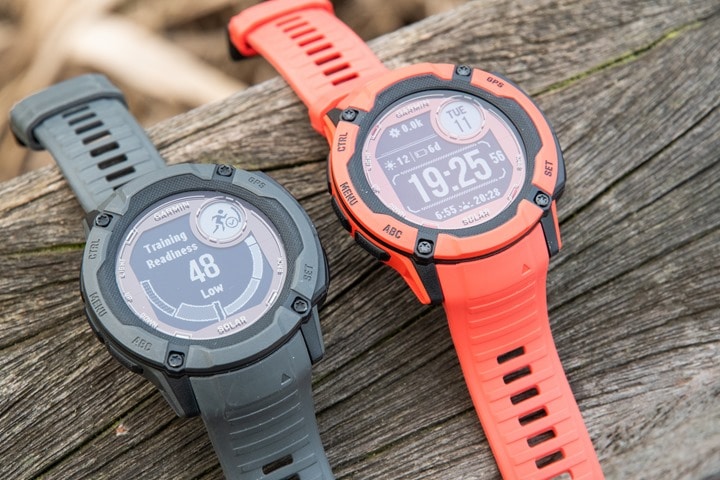
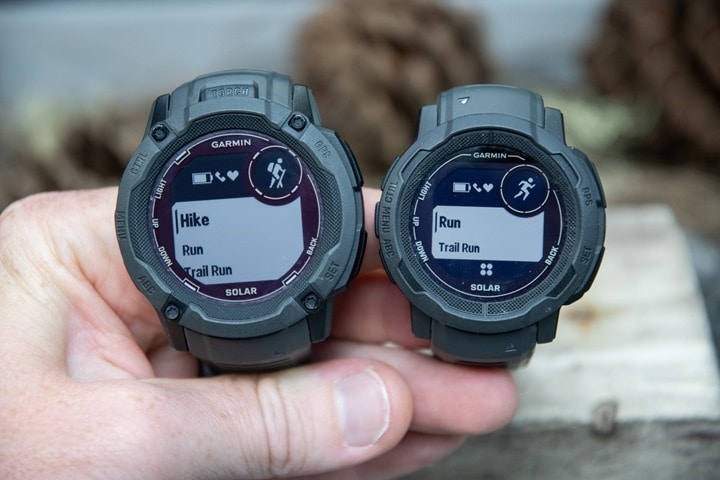
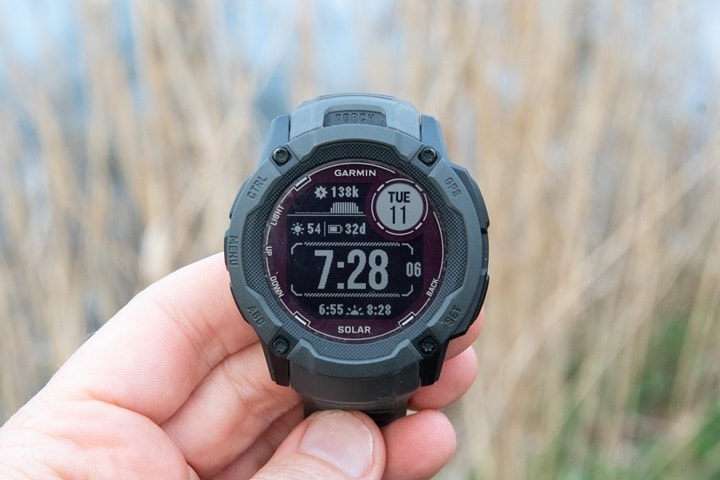
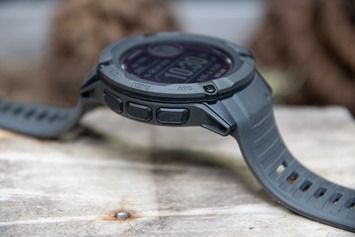
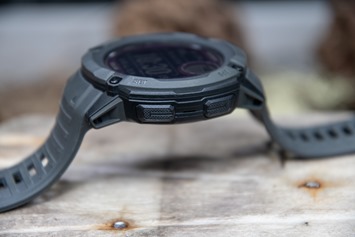
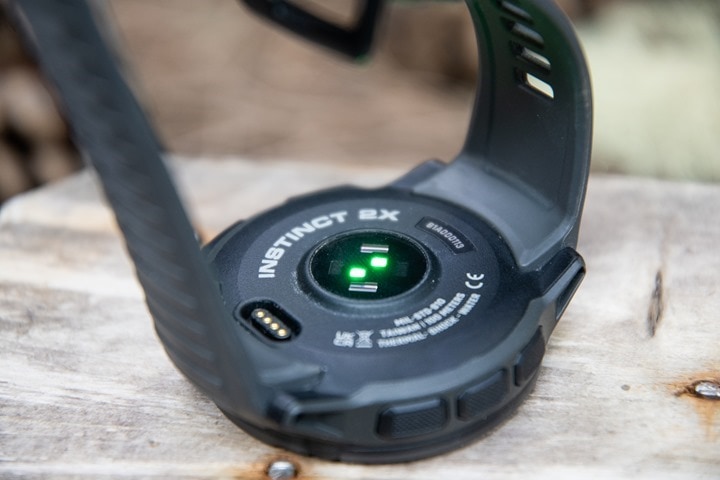
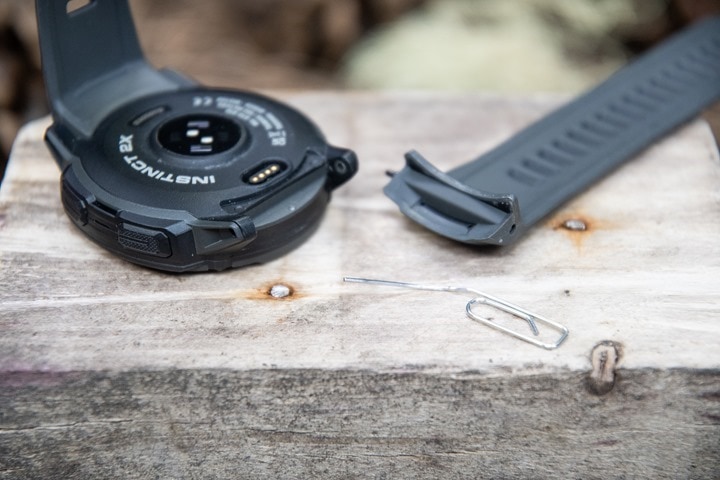
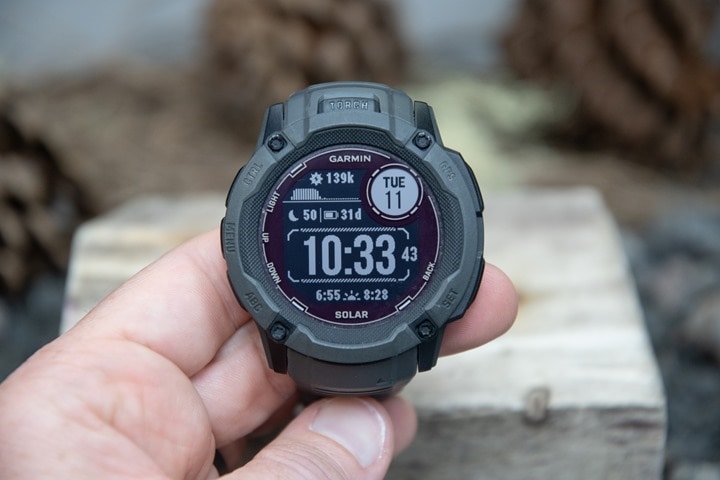
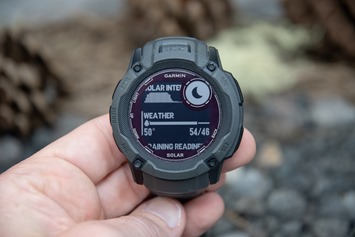
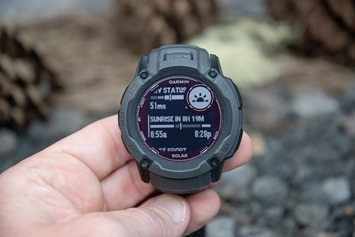
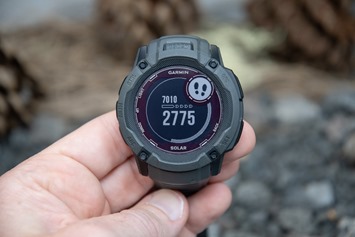
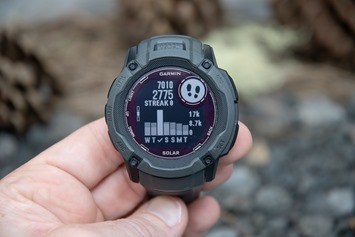
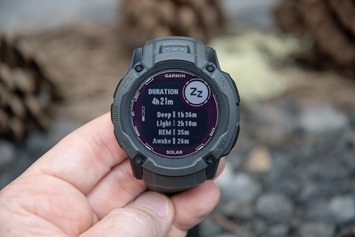
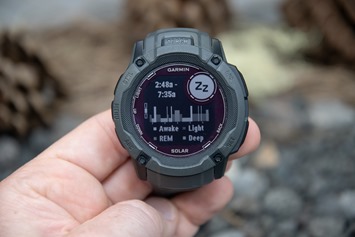
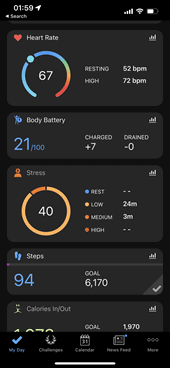
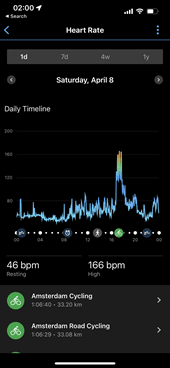
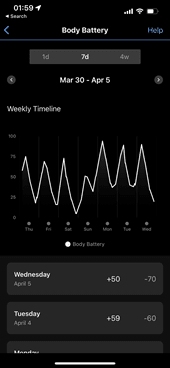
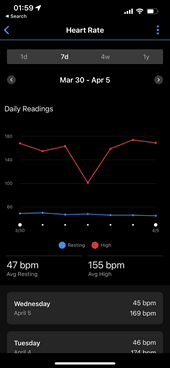
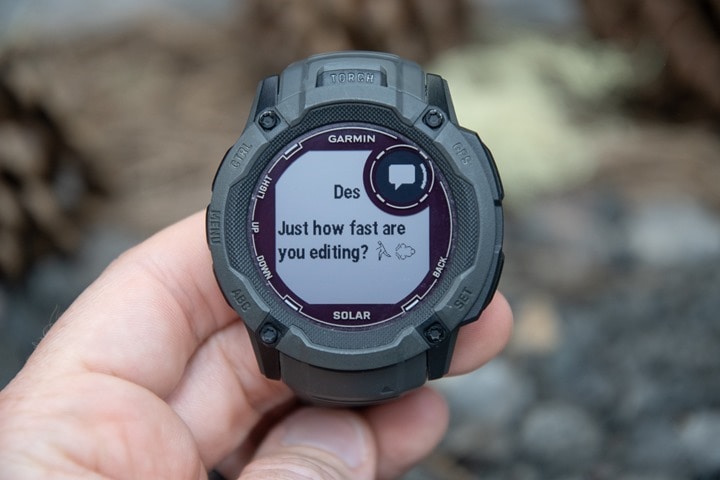
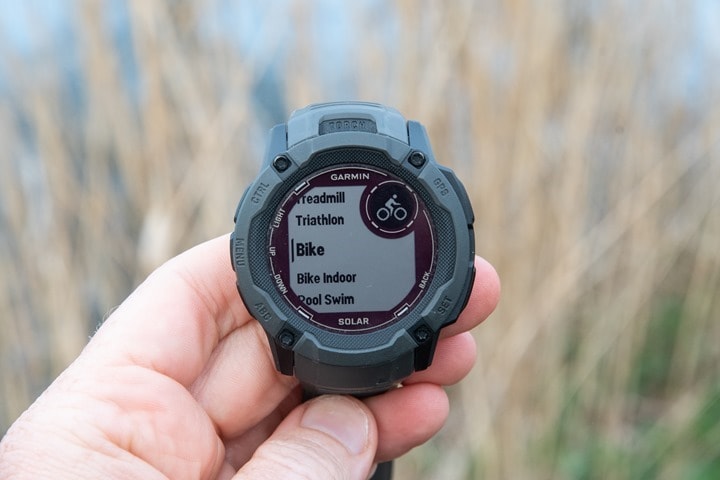
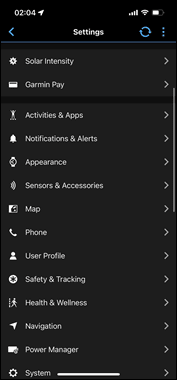
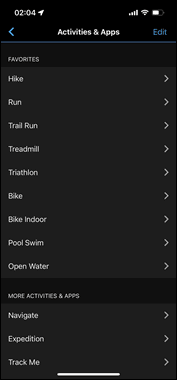
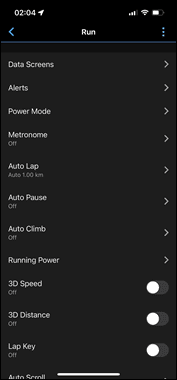
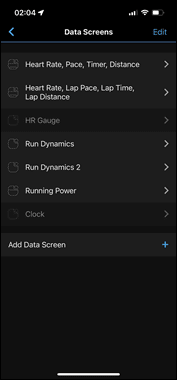
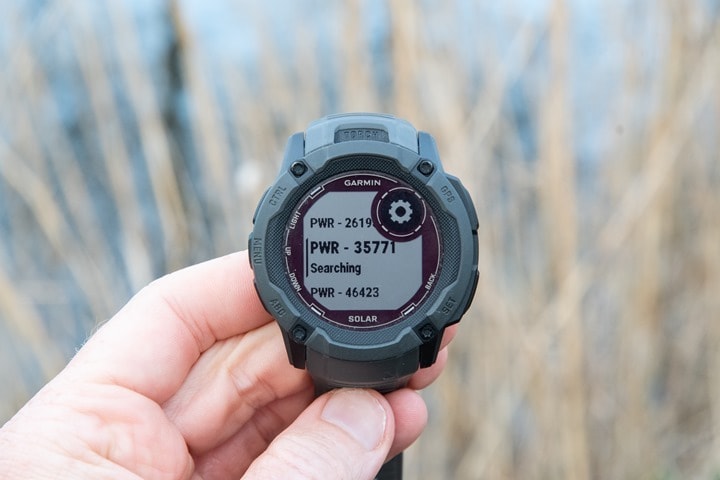
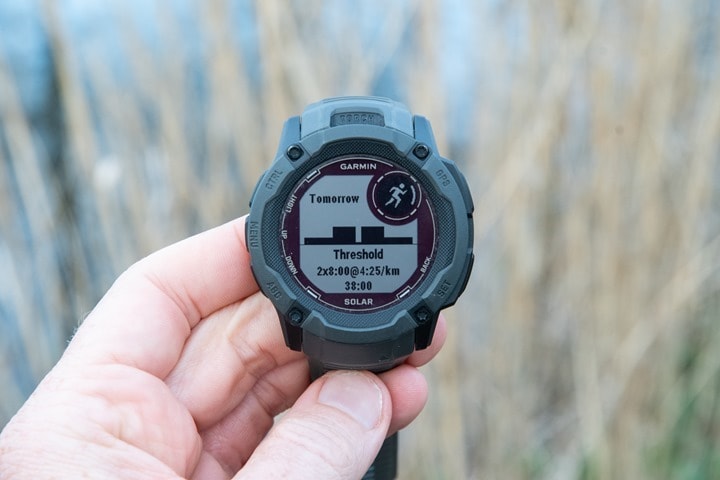
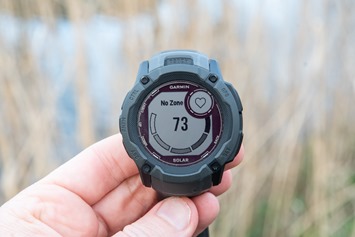
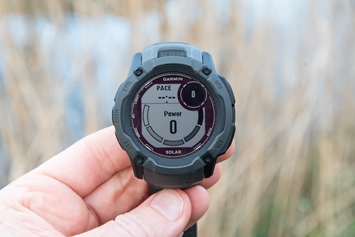
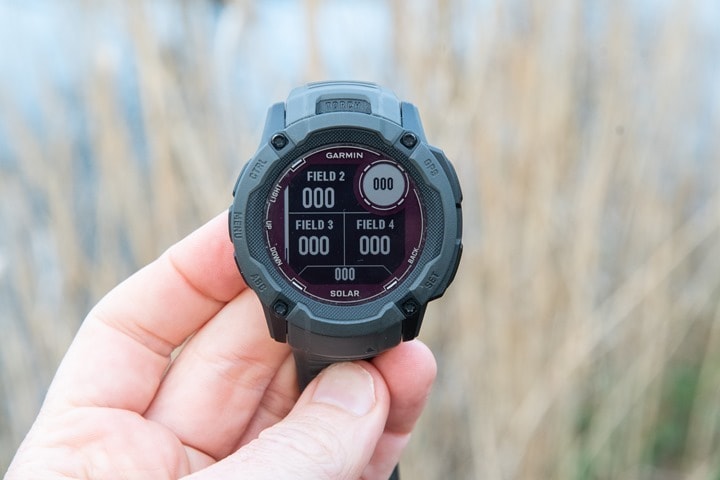
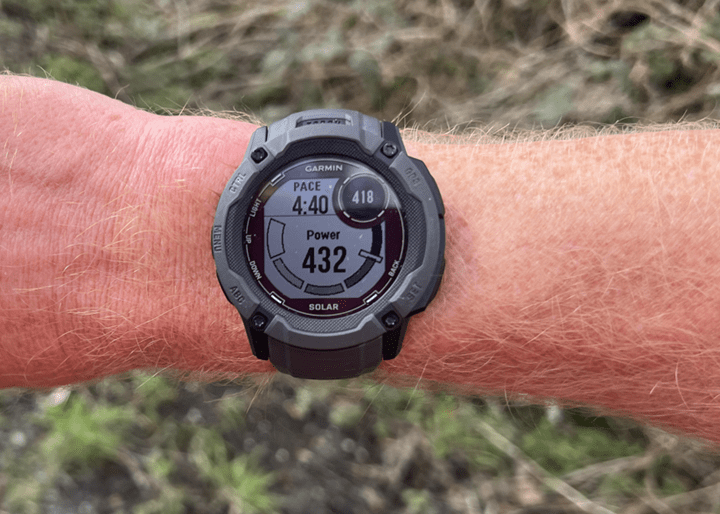
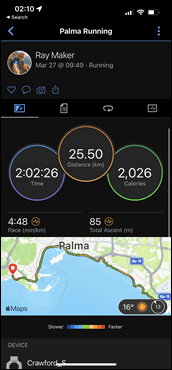
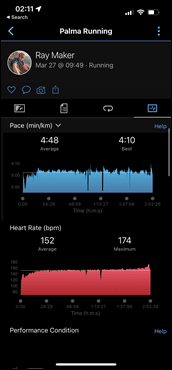
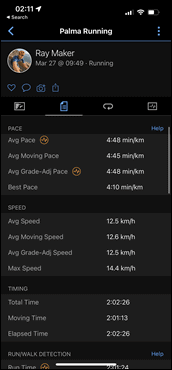
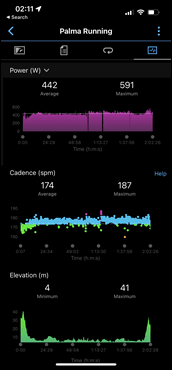
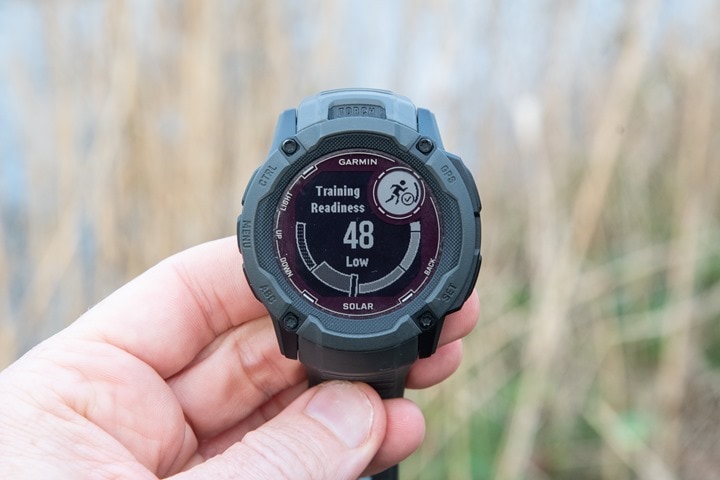
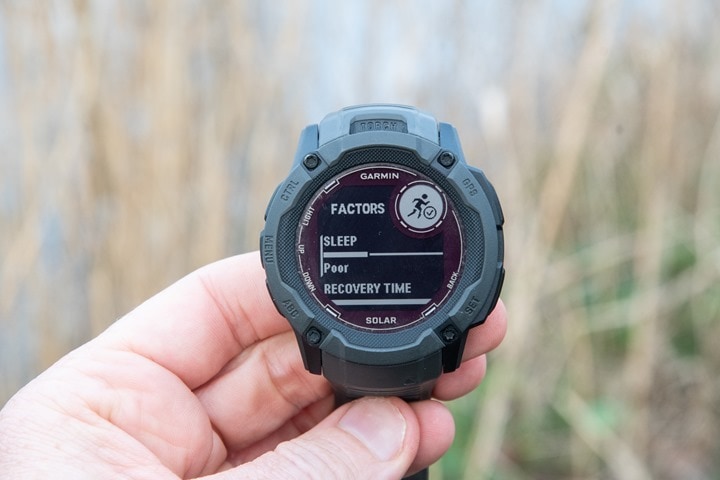
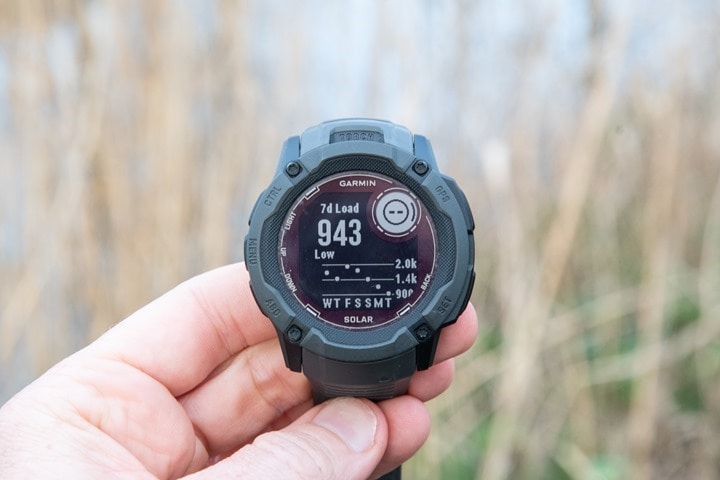
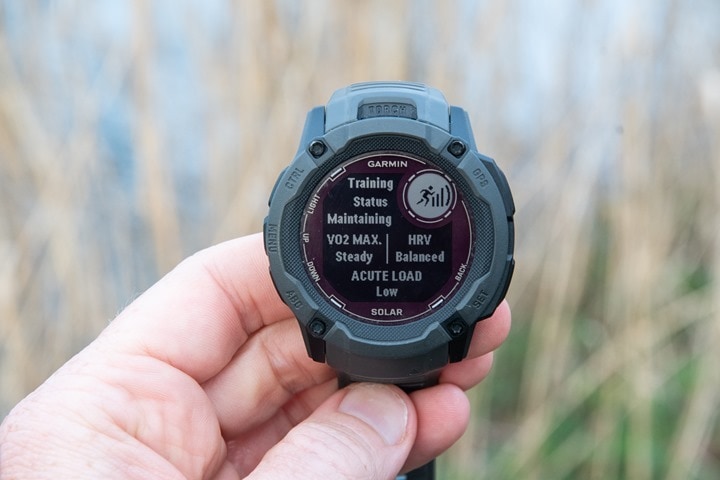
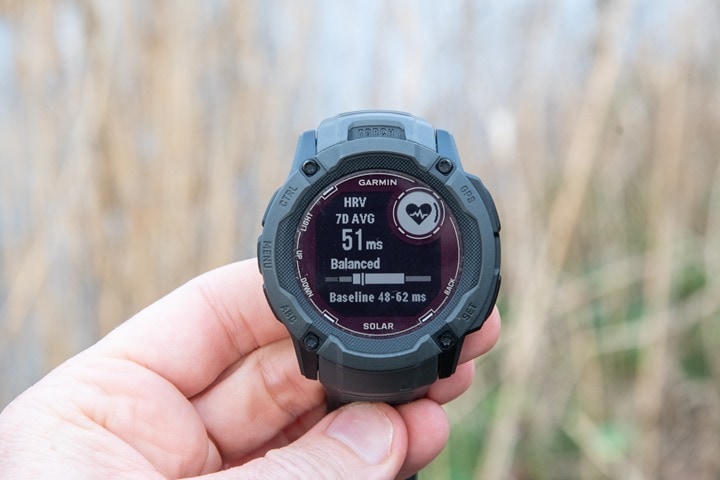
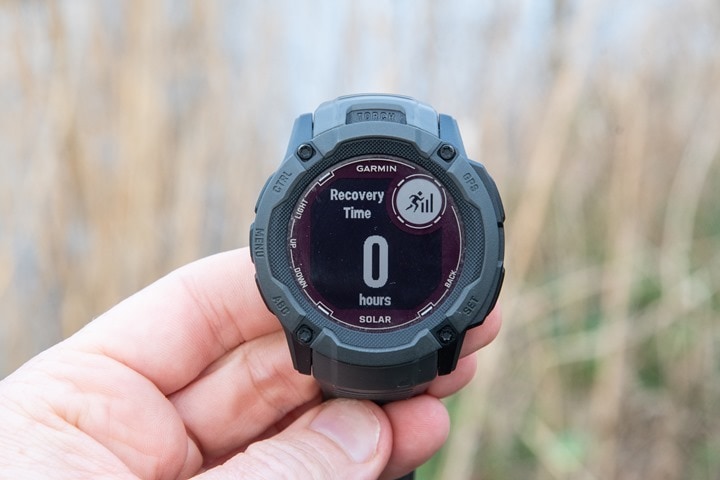
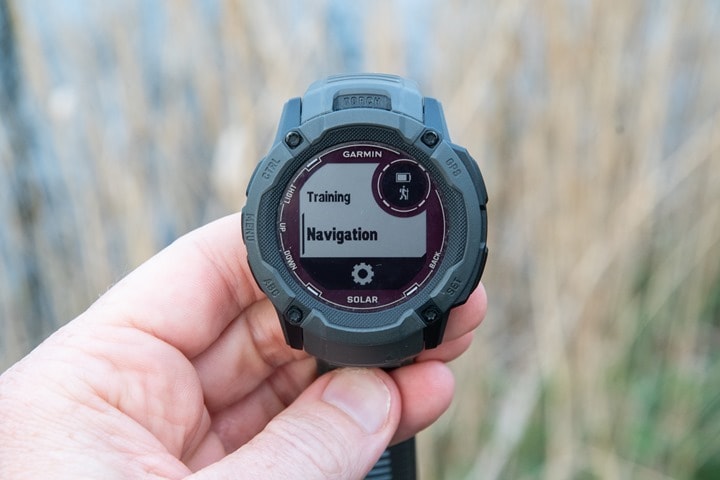
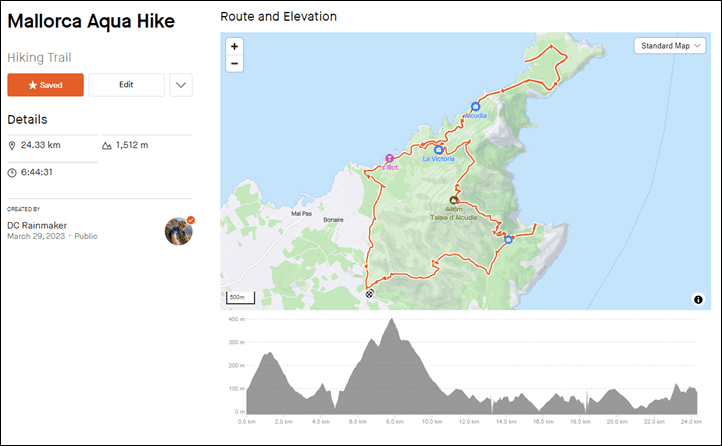
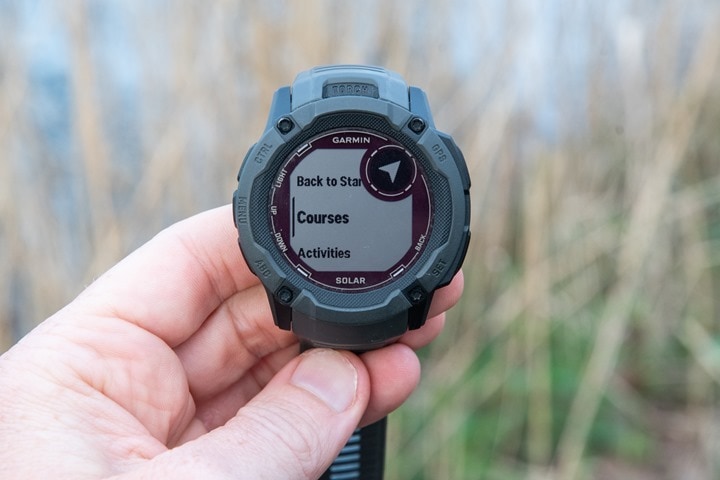
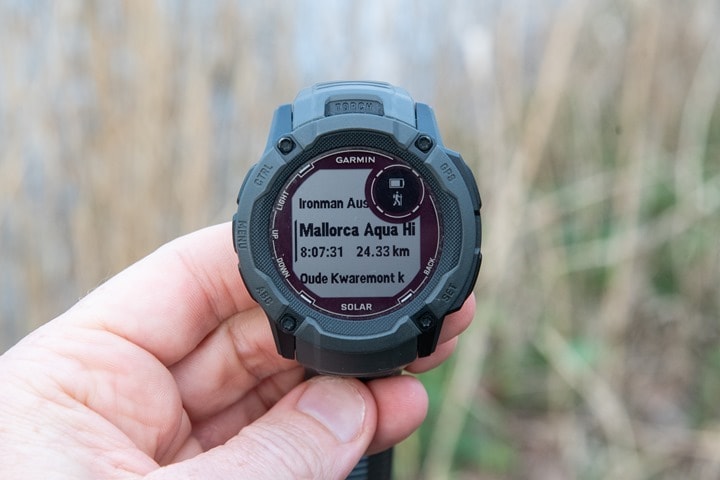
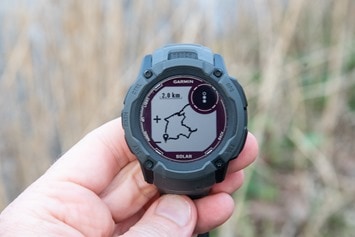
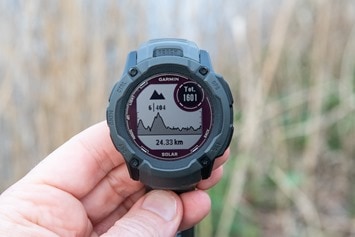
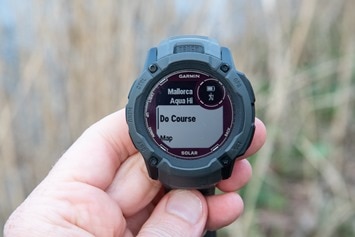
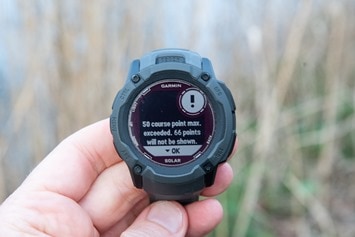
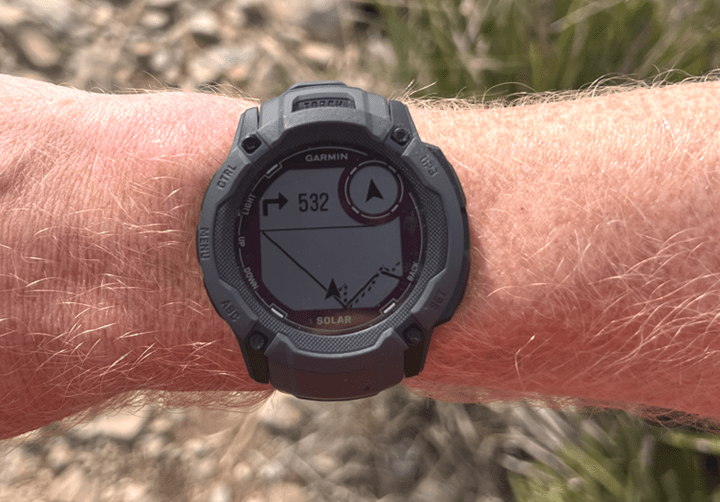
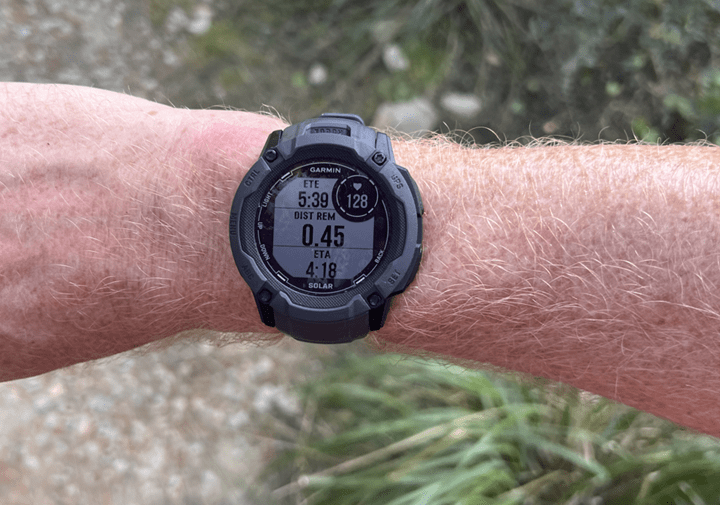
![clip_image001[6] clip_image001[6]](https://media.dcrainmaker.com/images/2023/04/clip_image0016_thumb-1.jpg)
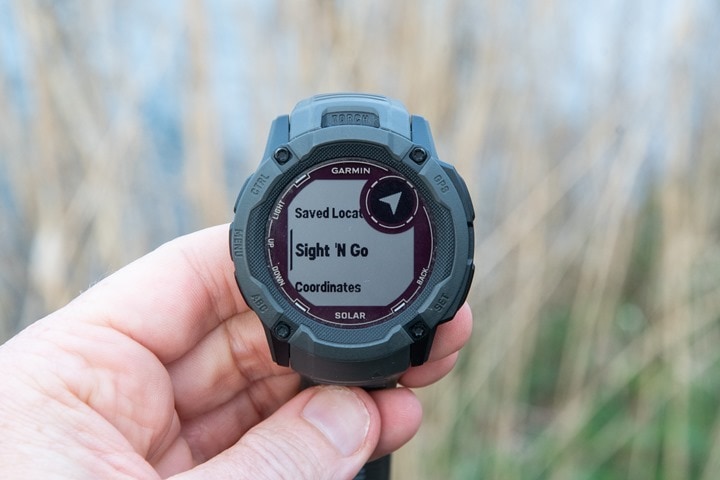
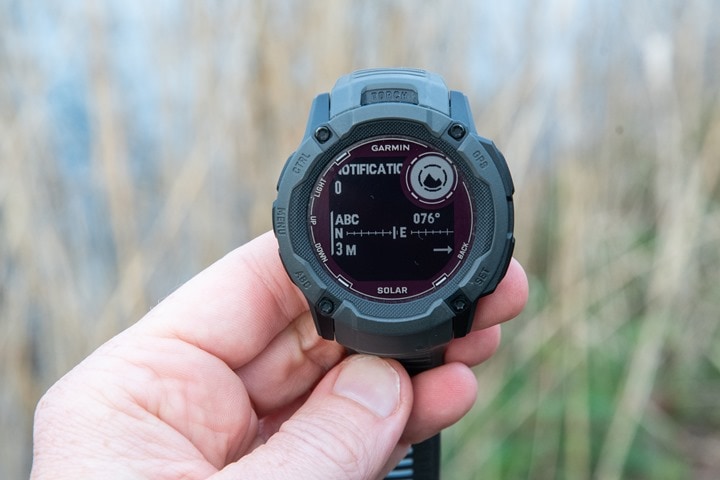
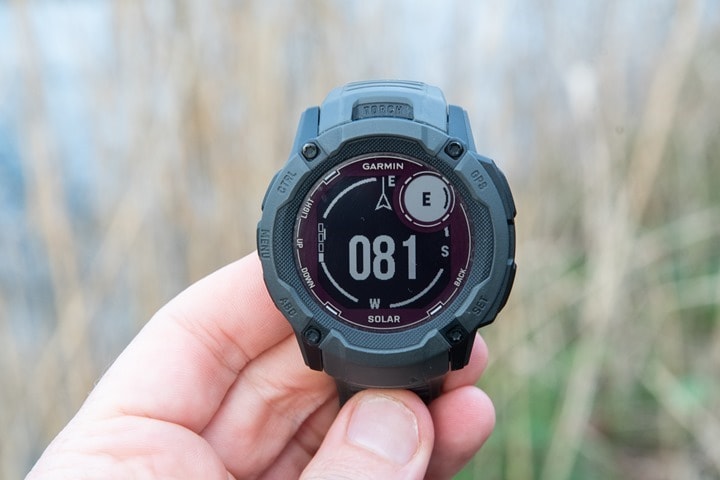
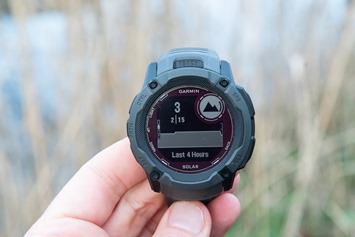
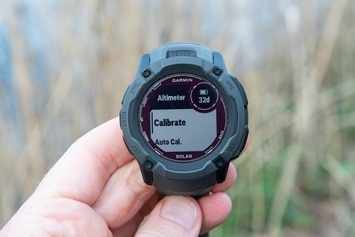
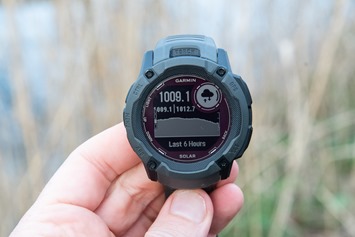
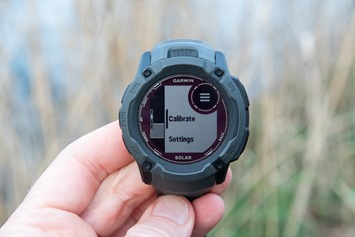
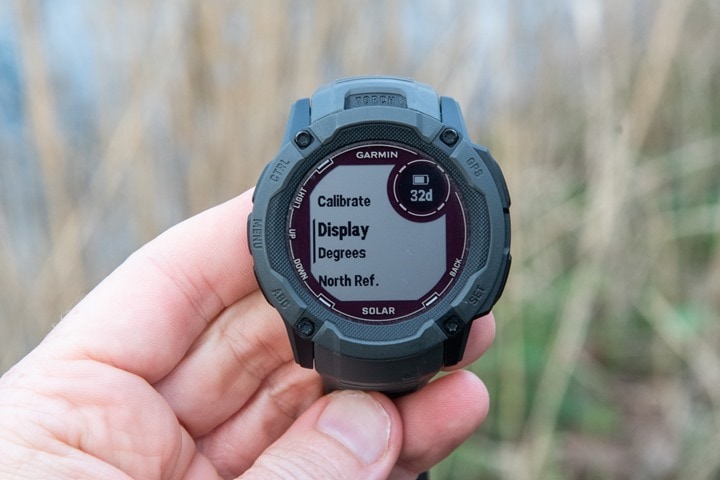
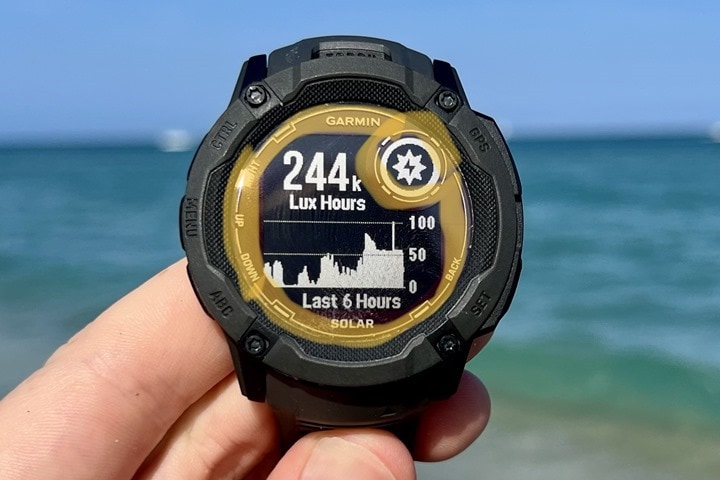
![clip_image001[4] clip_image001[4]](https://media.dcrainmaker.com/images/2023/04/clip_image0014_thumb.jpg)
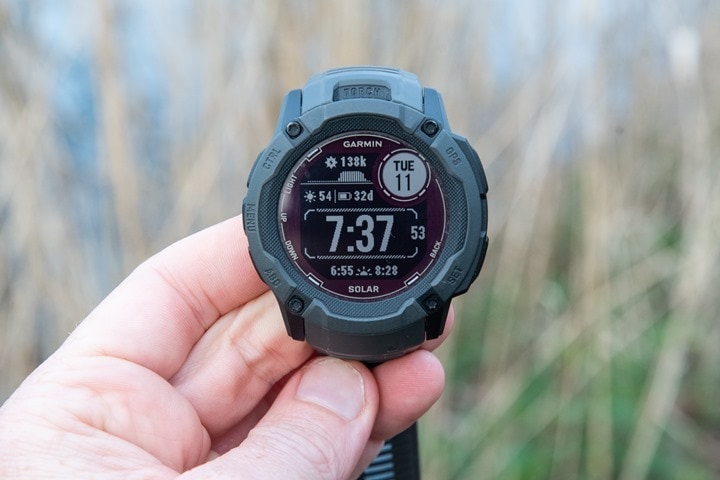
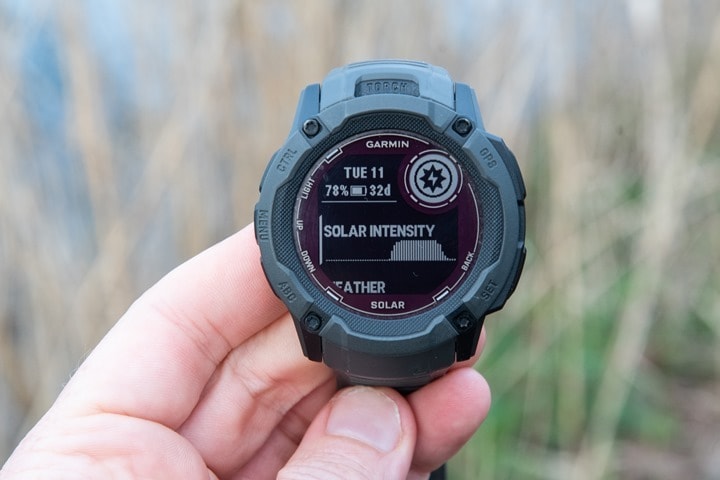
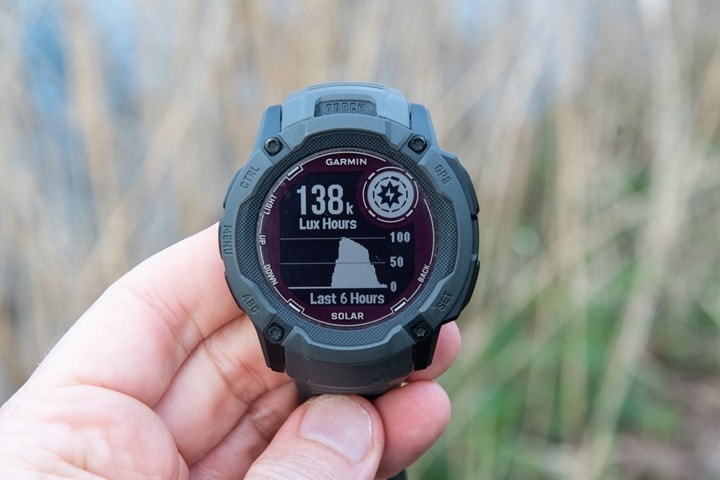
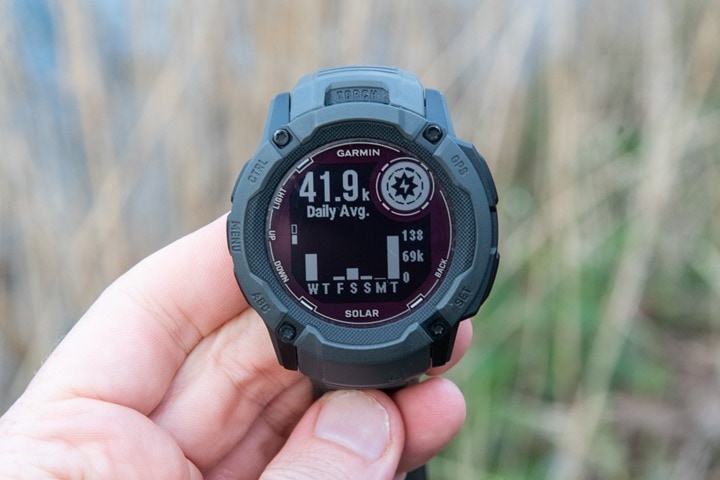



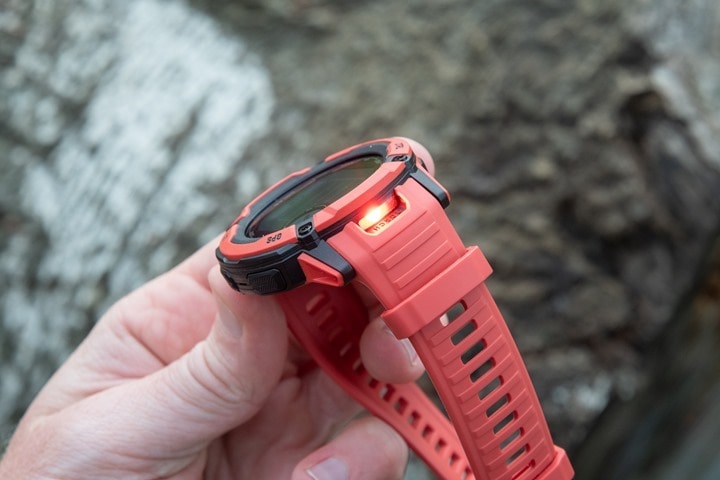
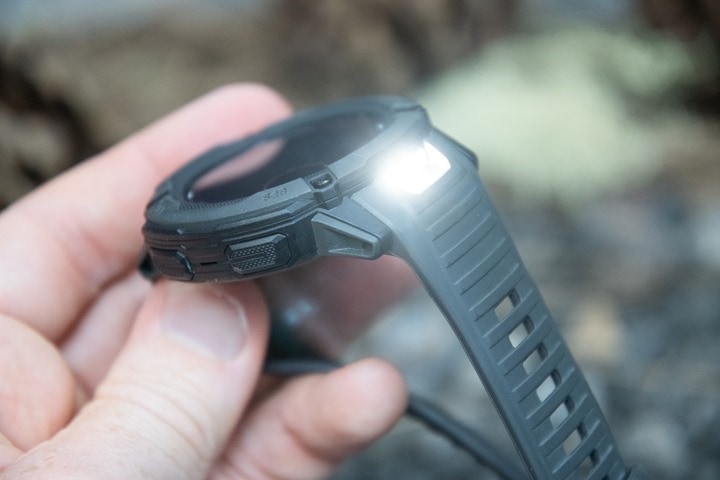
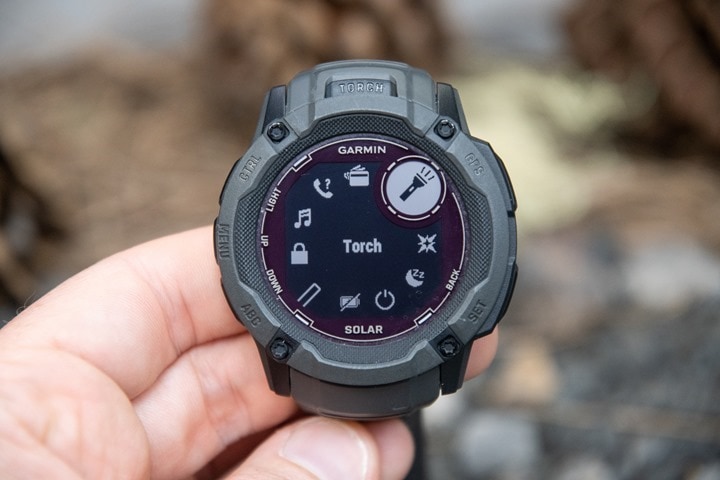
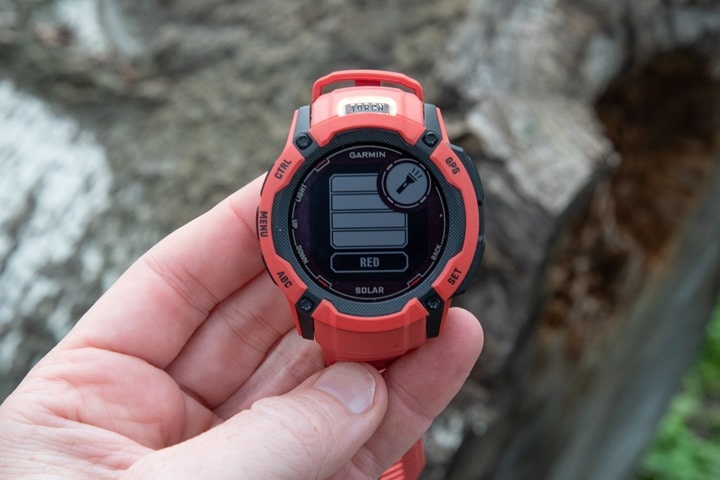
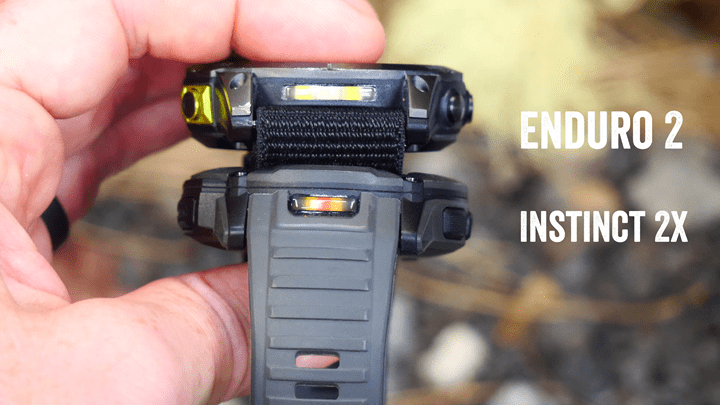
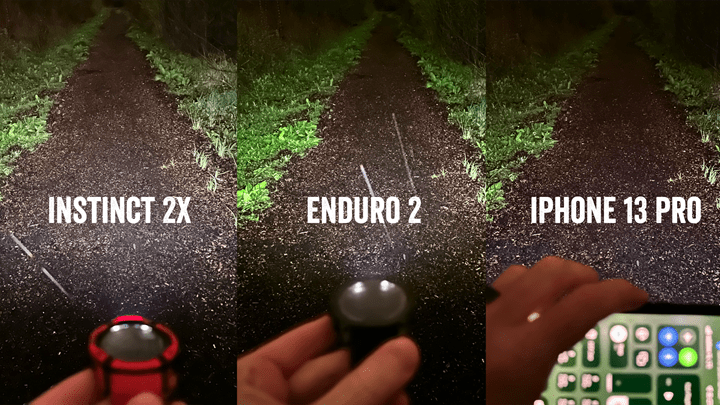
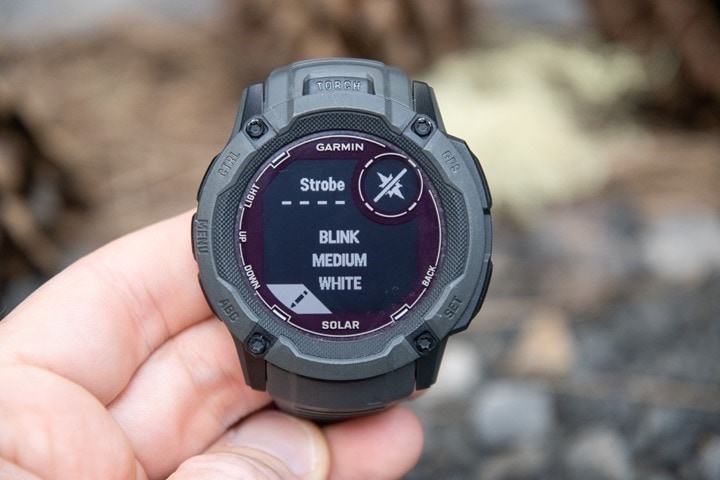
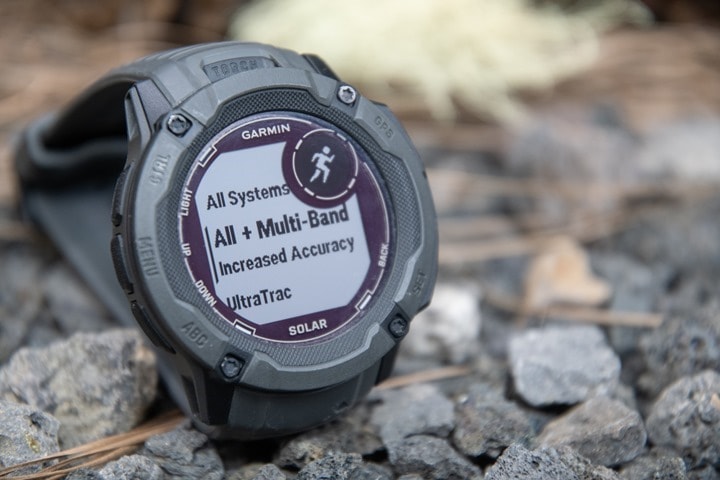

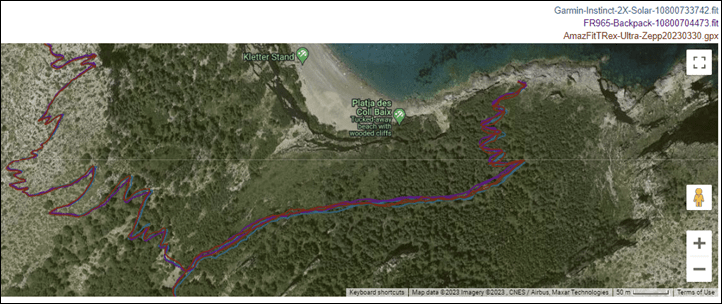
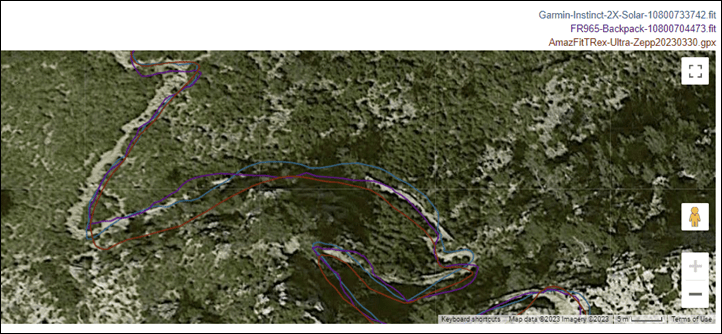
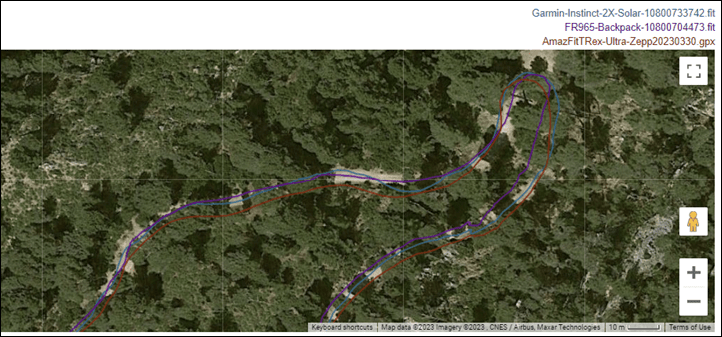

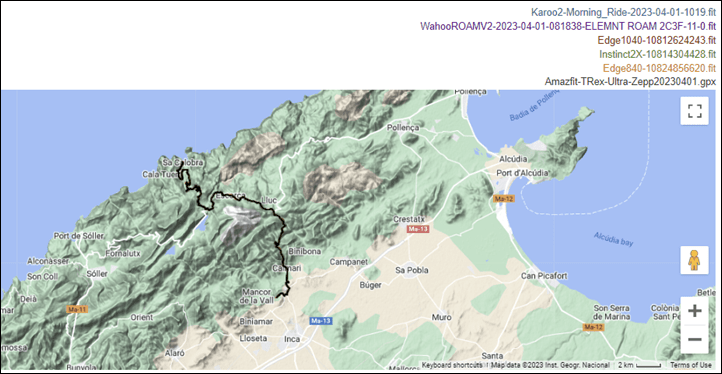
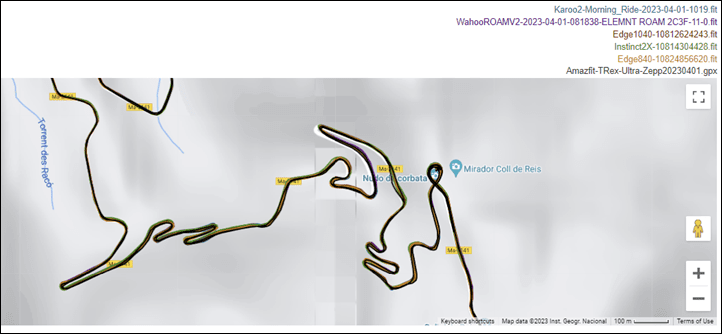
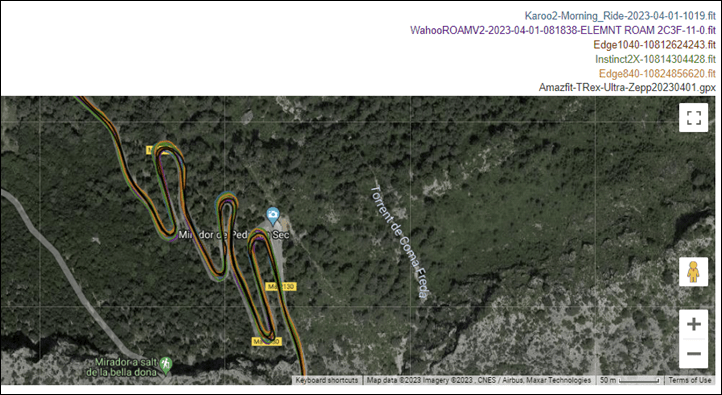



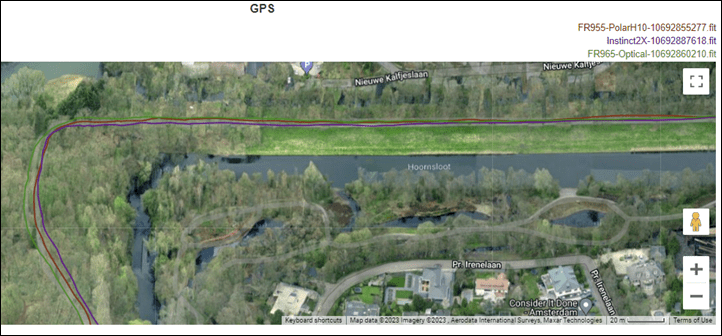


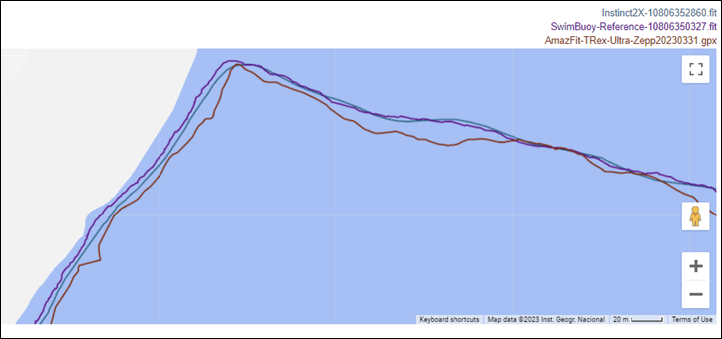
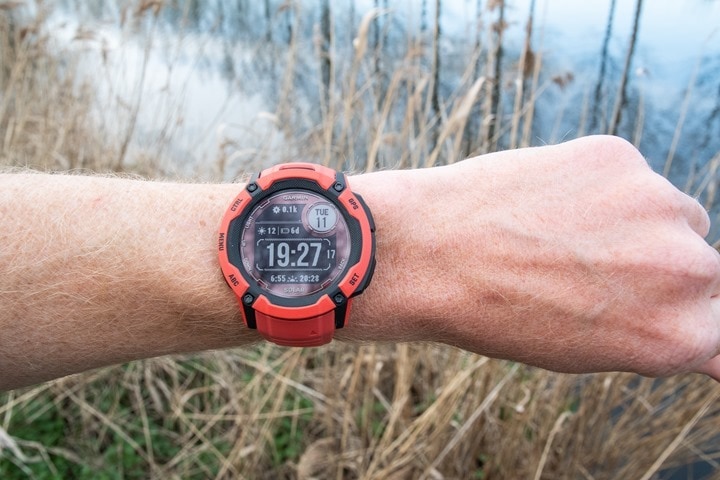
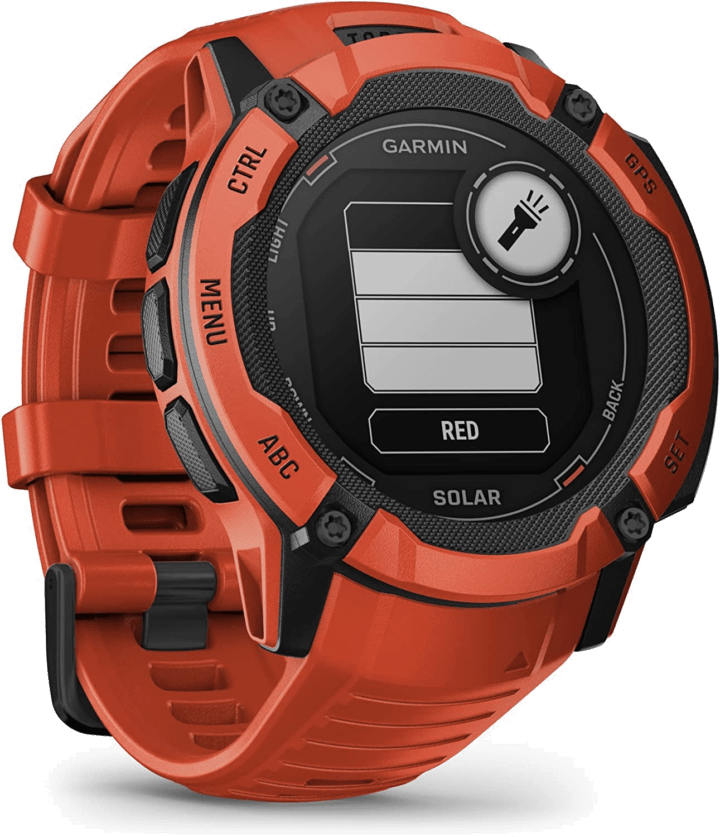
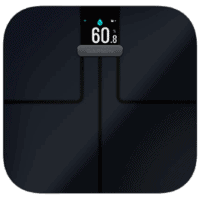
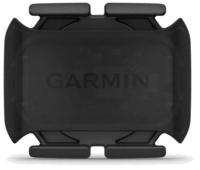
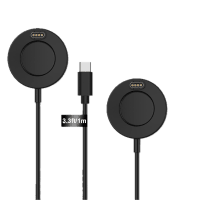
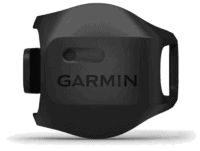

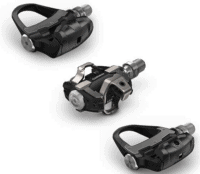
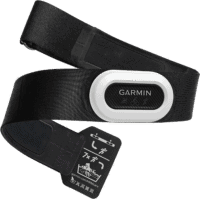


















“And like most smartwatches, you can also see notifications here – including emojis. You can’t respond/answer from the Instinct series, but you can clear/open/dismiss them.”
How about android devices? Can’t respond as-well?
Canned messages are ok for the whole Instinct lineup with Android. (I tested all of them, except this one). So I guess this is just a typo.
Ahh, good point on Android. Thanks! iOS doesn’t allow it.
I wish they’d add the flashlight to all of their watches (and a similar light as a daytime running light to all of their Edge bike computers).
For the watches, I think they are missing the proper placement, though. I think it should be on the front edge, illuminating the path of your hand/index finger pointing. It could be shoe horned between the two front buttons. Although this would be problematic for lefties.
I’m pretty sure, that would just light the back of my hand though. Or maybe my general wrist position is irregular :-D
This may be the geekiest thing I’ve done, but here’s a crude mock-up of what a flashlight between the 2 fwd buttons would look like.
First photo shows the beam produced,
It’s slightly blocked by my hand, as predicted, but this flashlight uses a less focused/more flood like reflector. A narrow focus beam wouldn’t be blocked, with a flat wrist position.
Second photo shows that the center of the led bulb in my mock up is approximately at the same height from my wrist, as it would be on the watch face, and that the LED bulb would easily fit between the buttons.
Second photo:
Ok, first of all, my hat is raised for your prototype :-D And you actually made me put my Petzl Bindi on my wrist :-D So, my (personal) verdict: In the “let’s find the toilet” scenario I guess I’m ok with both, doesnt really matter to me. Your positioning feels somehow weirder. I have a Black Widow wrist gun / Franky suuuuuper vibe. My natural wrist position has much more incline to the back. So to use it with your setup, I’d have to pay attention to keep it in a not natural way. Which I’d get used to I guess. However, if it lights the back of my hand, it is close, and very bright, so it can screw up my eyes white balancce. But it is tomatos vs tomatos. In the running scenario, both of them is kinda annoying. With your setup the direction would go from perfect to let’s look at the sleepy squirells on the branches. With the current one from “let’s light the road behind me, to light what’s on the left in front of me. I’d again prefer the latter, as the backlighting is good for “to be seen” reasons. And again, during running, I’d hate to hold my wrist like that. But that is just my therory, I’ve never tested any of those. Maybe in practice I’d love your layout better. Anyhow. the significance / length ratio of my comment indicates that I should rather be sleeping. Have a good one.
Ok, waaaaaaaaay belated on this Tyler – but I must say, that’s an impressive prototype.
I’ve pondered it many times over the last month or two actually, when using the flashlight, and I think in general the side-wrist option seems to work out best. Or, maybe I’ve just gotten used to it coming out of that direction. I could see how both ways would work though.
I’m really disappointed that the basic instinct 2 solar doesn’t get any of the new features…
Especially after we’ve been teased with both the upgraded solar widget and the morning report feature in betas and they took away both of them, even if many of us didn’t have a single issue with them.
This new watch is great and so is my normal instinct 2, but I really hate the idea of being unable to get specific features only because I have a smaller wrist (and no, I won’t believe that the smaller case is a limiting factor when it comes to software features).
Does you think the max course point issue will be resolved via some kind of software update or not? Also might sound a bit dumb but is the display always on or only on when you’re looking at the watch?
Hard to say. I’d have thought they’d have resolved it from the 2 to the 2X, but clearly didn’t…so…I’m not convinced they plan to.
” I can’t help be (extremely) disappointed at the continued max course point issue.”
Have to agree, it’s embarrassing, actually for Garmin. They should hang their collective heads in shame. Nobody should be able to make a better mapping/tracking course following device than they should be able to. Yet many simple apps/devices can do a much better job.
Sad actually. It would be a great device for hiking if they got that right, right now it’s got the looks but can’t wear the trousers.
Can you do with this watch a 100 miler with navigation?
After the 50 points limit, will the watch navigate you further but only without turn by turn?
Is the breadcrumb line to follow reliable? (no crashes and data loss)
Yes, only turn by turn is problematic
Correct on all items. I did a loop last year with the base Instinct 2 that was I think like 80 miles or so. As you noted, it’ll show the breadcrumb trail and all, elevation too, and no crashes, but just not TBT.
Thanks Ray!
Another question, is it the same gps chipset from the Instinct 2 or the newer chipset from the Fenix 7?
The newer multiband one.
I believe that the Instinct 2S Solar has multiband/dual-frequency GPS/GNSS.
Nope, it’s new on the Instinct 2X series.
Do they get large military contracts for this watch?
They previously had some sort of US Air Force contract for pilots to receive devices. That was a number of years ago though, and I don’t know where that stands today: link to military.com
Garmin tends to be very skittish about talking about/marketing anything in the military/tactical realm, for fear of pushback. Just a cultural thing.
FWIW, a significant number of military personnel can’t even wear this watch on the base because it has outbound communication and/or inbound communication plus data storage, and those are forbidden in classified materials spaces. Basically any watch with a bluetooth, wifi, or two-way sensors meet the criteria.
GPS-only is fine, as are watches with atomic timekeeping radios. But they can’t store anything. Basically, you’d have to take it off when you take your phone out of your pocket and put it in the lockbox.
Ray great review as always. I noticed on the Garmin website the tactical version comes with the ballistic calculator. It says you have to unlock it so it may not be the same as on the Tactix but still that’s one of their higher end feature brought down to their mid-end watches.
Thanks for the review, Ray. I had a “what I wish for the I2 to have” list way back, and I think this one checks nearly all of the boxes. One question: can you check the training data page? Is the layout the same as it is for the regular I2? The step timer / distance counter was in that little window previously. Which was kinda hard to read during workout. (I know, my eyes aren’t the best.) On the Crossover, it is displayed in much larger fonts, which is absolutely a big plus. It would be nice to have it this way on regular Instincts as well. Thank you!
Thanks.
Indeed, still the same there. Here’s a picture from a workout a week or so ago.
Thank you! It is a pity, I really hope they will change that with a software update down the road.
Ray, could you please confirm watch doesn’t have problem with display when looking at it from an off angle (i.e. side) with backlight on at night ?
Instinct 2 had this issue.
I can read the screen from all four angles, down to basically flush, with the backlight on. Here’s the normal angle here. Sorry, a bit fuzzy trying to take a picture in the dark handheld with phone.
Very interesting report. Thank you. I own and use regularly an Instinct. Just the early basic model. I download routes into it that I draw using 3rd party software (Caltopo). There are a few steps but once you’ve done it a few times it’s quick and easy. I’ve drawn fairly extensive routes and have never had issues with them being truncated as you describe in your review.
As I read your review I was getting excited enough to go right out and purchase an Instinct 2x but when I read that the routes get chopped at 50 points I lost all interest. You’d think they would eliminate straight-line points and keep the overall shape of the route to the end.
when I read that the routes get chopped at 50 points I lost all interest. You’d think they would eliminate straight-line points and keep the overall shape of the route to the end.
That’s not what happens. You can only have a maximum of 50 turn alerts and similar (technically these are coursepoints). The course itself can be very long and the shape will remain accurate, it just stops giving you turn alerts after a while.
Ah, that’s different. Thanks for clarifying! Maybe I’ll get one after all.
Exactly. I used this watch hiking the Long Range Traverse in Newfoundland this summer as a backup to my handheld gps. The trail is not marked so navigation is essential. The Instinct held it’s own against the Garmin 67 and the flashlight was extremely handy in the tent at night.
Am I understanding that with solar and a monochrome screen this thing only gets the same “GPS mode” battery life as a Fenix 6x pro? see e.g. link to www8.garmin.com
I actually really like it, even so, I’m just curious because that seems wrong.
I mean, it’s 60 hours to 145hrs for the Instinct 2X, versus a mere 60 to 66hrs for the Fenix 6X Pro.
If I remember correctly from some conversation somewhere, basically the base “GPS Only” mode between the different chipsets is different, and with the shift towards other GPS modes as defaults, the system is more tuned for gains there. Or something like that.
With all these bigger watches will Garmin add Vivosmart 5 to unified training so we can wear a smaller device during work or non training as this watch wouldn’t fit a suit look!!
Any size comparisons with the Forerunners?
On pool swim, I am curious to know what has been your experience with all Garmin watches (I own 945) when it comes to accuracy of distance swam. I always get 25-75m more than actual.
The Apple watch, however is spot on.
It’s been spot-on in my swims. I’ve been comparing it to a FR965 and Apple Watch Ultra for my pool swims, matches exactly.
That said, I’m only doing freestyle – and I generally don’t have too much pool furniture to move around during my swims.
Let’s not forget Garmin removed morning report from instinct 2 , with the excuse that there were problems with the beta, when in fact the beta users said it was working great.Garmin used the instinct 2 beta testers to test the newer features like morning report for these next instinct models , and lied to everyone in the process, including yourself who reported that instinct 2 was getting morning report.
Seriously, they should be taken to court.
does it do golf?
Hey, any chance you’d be able to post a pic of the green backlight on the Tactical series? My first timex had a blue/green backlight and I would pay the extra $50 just for the nostalgia. Thanks!
Thanks for the comprehensive review.
Does this watch not have the “bezel gap”, which the Instinct 2 solar has?
See link.
Talk about coincidence…
Yesterday, my Instinct (1st Gen) stopped during my swim activity.
Until then, it had worked flawlessly fore more than 4 years.
The watch just shut down and restarted by itself in loop while vibrating.
After about 1h, it stopped (I guess the battery was dead).
In the evening, I charged it and plugged it to Garmin Express hoping a sync would restore it, but it just went on/off in loop again. I also tried a hard reset but no result.
Finally, this morning I reached out to Garmin support. Amazing how fast they reacted : I just had to send the serial number, a picture of the watch and a copy of the invoice and there you go: “we will replace your Garmin watch. Please follow the procedure hereafter…”
This procedure turned out to be actually an order I was placing for a replacement watch for 120 EUR… for a watch that I bought 250 EUR 4 years ago… good deal ?!
Talk about coincidence… or bad luck… thank you Garmin.
Given the similar price point is there any reason to get the Garmin Forerunner 265 solar over the Garmin Instinct 2x Solar?
It depends on the audience, the Forerunner 265 has a color AMOLED display with touchscreen and offline music playback and these features may please the average audience more, particularly for the same price I would go with Instinct 2x (I have a Forerunner 955, aka plastic Fenix 7) .
Thanks Ray for the nice review ;-)
I have the Instinct and one thing that I would like to have is the ability to edit the position of the fields of an workout (not the same as data fields of an activity ). Sometimes the information that is most important to me is n the little circle :-(
Has this changed with Instinct 2X?
All the best
Unfortunately, it seems it didn’t. I asked the same a little bit above, and Ray was kind to submit a photo. The training data page looks the same, and I’d be surprised if it was editable.
link to dcrainmaker.com
Thanks RunnerMate,
Just read your comment. That’s exactly the same limitation for me ;-)
Why is the variable that we want to control in the small window? Garmin allow us to change the layout/fields ..
From Ray’s photo there is an additional field …
Regards
Just poked around, I don’t see any obvious way to change the Structured Workout setting options for data fields, nor do I see a way to recreate my own with the structured workout fields (some Edge devices allow that, basically letting you DIY it).
But yes, they do use that top-field for the target. To be fair, it didn’t really bother me.
My Instinct 2x arrived end of last week ;-)
The aditional size is a plus for my workouts. Much easier to see the info in the samll circular window :-). I was afraid it would be to big for my “small” wrist bu it fits fine!!!
Much more “customizable” and lots of aditional info. The red and white torch are great.
Thanks again Ray
And it also is perfectly aligned with the Lenovo branding of your laptop.
With the price-point going down to the EUR 300,– it becomes appealing to have a watch that doesn’t need to be recharged.
But still in doubt for activity saving times and power meter support …
// Remo
” Price actually stays the same at $449 (compared to existing Instinct 2 Solar units)”
Not in Sweden though …
Instinct® 2S Solar & 2 Solar 4.299 SEK
Instinct® 2X Solar 5.299 SEK
A difference of ~ USD 97
Does “Training readiness” and all that Jazz takes in account non sports activities? Yesterday I drove like 12 hours and on the trip, after that I was sure I will be ready to make a short run, but I arrived, ate something and got directly into the sac.
It does take stress/sleep into account, I noticed that driving usually elevates my stress level so that should play a part.
Great review as always Ray – thank you.
I have two questions on the Instinct 2.
1. I had an Instinct 1 Solar for some time. Over that time, the screen got water-marked at the edges and I could not remove this, even using cleaner and toothbrushes. I saw this on other used examples too. Have you experienced this and if so, has it been rectified in the newer versions?
2. You say the watch face is fully customisable however in my experience, this is not true. I have been quite frustrated by how inflexible Garmin’s watch face customisation is. There always are fields that must be included and never blank, or a lack of options to display or not things like second hands. If I want a watch face to just display the time and date for example, it was impossible on the Instinct 1.
I know Garmin would direct me to the Connect IQ Store however I think it’s reasonable to be able to expect actual full customisation of watch faces on expensive smart watches.
Thanks again!
I believe, that ConnectIQ truly means, that you can fully customize it. To my understanding, your issue is not with the level of customizability (I’m pretty sure, I just made up that word), but the flexibility/list of the built-in options. I think those are two different issues.
Having said that, I also opted for a minimalist watch face with the big hour/minute display, and put the least frequently updated fields in the small data fields (battery, sunset, date and moon phase in the window). And I completely agree, that it would be nice to have a truly minimalist by default. Or to have Body Battery level in the list at some places.
One additional note: I believe that you can very quickly put together such simple watchfaces with FaceIt. (Although CiQ is only available since I2)
Thanks for your reply and coming up with a better explanation than I did!
You’re correct – I do mean the lack of flexibility of the built-in options. It’s the same across all Garmin watches I have owned and is frustrating.
I have an Instinct 1 (Non Solar) and also has “water markings”, but I guess is because where I lived the water is very “hard water” (which means it has many minerals) so even water heaters needs to be cleaned monthly.
Hi, just soak your watch in dilute vinegar or lemon juice for a while and it’ll shift those residues (the white residues are carbonates so you need to use dilute acid to dissolve them – they’ll actually bubble a bit :)). I’ve done this loads of times and my watch still works fine so it’s pretty safe.
I think it is worth noting the design similarities between this and a G Shock, especially with the screw placements now changing too. I mean, I get it – this blows anything Casio can make out the water from a technical point of view, even with the new GBD H2000 (which doesn’t even connect to Strava). But I do wonder when Casio are going to start challenging Garmin from a design point of view and where the legal boundaries are in terms of design copying.
Yeah, since Garmin introduced the first Instinct, it was obviously meant to ’emulate’ Casio’s look in some respects. Or a ruggedized look, whatever that may be.
From a functionality/features standpoint, as you noted, it’s not even really a competition. The Casio units continue to be for people brand-loyal to Casio. But for anyone that wants a functioning ecosystem/platform, they won’t select those GPS watches – and will pick literally anything else on the market. It’s kinda astounding how bad it is from a sports standpoint.
If I swapped the band for a quick fit 26 would that make the watch fit less better and would it block out the torch ?
There is actually a YT video from FitGearHunter were he changes straps…fact is, the torch is not obstructed by either a different quickfit or even a nylon strap.
cool thank you
Hi Ray, did you see also improved solar charging “not in direct sun” like in buildings where Casio watches are charging as well with their panels? Would be nice if efficiency has been pushed as well.
Regards Tobias
No change there, doesn’t charge inside.
I think the challenge to keep in mind is that while Casio charges in scenarios like that, it doesn’t have a meaningful amount of charging power from that for any sort of GPS operation.
Is it actually the backlight that’s green on the tactical edition or is it the torch/flashlight?
Good catch, it’s actually the flashlight. Specifically it replaces the red for green, the white one is still there.
Could you please measure the lug to lug height? I know the diameter of the watch is 50mm. Just wondering overall height?
Just measured.
So the inside of the lugs is 26mm (basically, the strap width).
The measurement of the outside of the lugs, is 34mm (from one outer side to the other outer side, inclusive of the lugs).
Measuring the ‘height’ of the lugs is tricky because the slant down, from 7.75mm to 5mm.
Great – thanks. So if you were to place the watch flat on a ruler and eyeball the entire top lug to bottom lug, would you say the total height would be about 60mm then?
Gotchya, now I know what you’re asking.
Yeah, so using a caliper, it’s roughly 54mm from top lug to bottom lug. However, the not-so-flexible watch band material actually extends beyond that slightly, and puts it at 62mm inclusive of the hard rubber part before it transitions to soft rubber. So long story is 62mm would be the ‘real’ diameter inclusive of the lugs and non-bendable portion of the band. Pic attached.
Awesome thanks – I was trying to determine if my wrist would be too small. But I might get away with it!
Love your site and detailed reviews BTW!
Hi Ray. The most complete review in the internet. Thank you very much. I’ve ordered a black ‘normal’ one.
My question is if the new 2x shows the same items for surfing (I mean, same as Garmin2 instinct series).
Thank.
I would be interested in this information as well! What does 2x do with its “surf sport mode”?
If anyone had any experience so far it would be much appreciated, thanks
Thanks for another great review. Lets hope Garmin will address the 50 waypoint issue.
What I found odd, coming from Epix and currently using a 265 together with the I2X, that you can’t see your overall stress score when you open the widget. You can only see the current one and a graph which is pretty useless. You have to go into GC to see it. Not a big deal, just an observation.
On another note, I am happy to report that the IX2 pairs flawlessly with Concept2 trainers. The reason why I sold my Instinct 1 a long time ago was, that it didn’t pair back then.
The breadcrumb route shows no arrows on the line. With the 50 waypoints limit in mind, when you have for example a 100 miler with overlapping route, will you get the right direction? So i don’t get the wrong direction back to finish?
I hope the watch uses the 50 points for the most important directions and not the 50 first points in the route?
Can you help me?
It’s, unfortunately, the first 50 points, in order, not the most important points.
For overlapping bits beyond the 50-point limit, that’s where it gets messier. In this case, it’s not going to warn you of turns anymore, so basically you’ll just have the line, that’s it.
What you might want to do is break it up into a few chunks. Then it’s easy to load the next chunk mid-route. Obviously, on the whole this is annoying AF, but, technically fine.
Thanks Ray.
Looks like i’ll betyer choose for the more advanced Fenix line or the next big Suunto Vertical! 😜😉
It seems that loading routes via the Komoot app overcomes this issue. I have loaded a few fairly complex routes on my 2X and certainly haven’t had any warning messages, though unfortunately haven’t had the chance to actually go on the routes to check.
Interesting, I’ll do some checking. I know I got errors on some Komoot routes in the past that I used. But I’ll do some more checks.
Generally speaking though you don’t need to go on the route to validate it, it’ll throw the error the moment you try and open the route/course.
Hmmm. I decided to see if I could max it out and it wasn’t difficult. A 60 mile hike crashed the watch altogether so not exactly bomb proof! 20 mile hikes seem manageable but that’s not really great for cyclists!
I just ordered a 2X. I currently have a fenix 6X which has been great, but the clincher for me is the flashlight….especially the red light. In my work (yacht captain) as well as my job as an RNLI lifeboat crew member means that having quick access to a red light should be very helpful.
this is my exact situation and thinking of going for the Instinct 2x
Thx for the detailed review ray 👌🙌. I have already ordered the Garmin Instinct 2X Tactical which would be an upgrade to my Garmin Instinct Solar as I think its a huge jump. Love the Torch light feature which I did a research and found out the white light outputs 64 lumens. Any idea what’s the lumen on the red or green light on the Tactical ? as I could not find that out anywhere.
Hi Ray, thanks for the detailed review. Please can you confirm if the Instinct 2X does not have the PacePro feature?
Many thanks
I heard that this model is not able to log HRV during a workout, using a HR strap, like you can for example with a Fenix. Can you confirm if this was really left out of the Instinct line?
Seems strange for a watch that is even able to collect HRV with its own optical sensor. Why turn this off for people that even went and bought a Garmin chest strap?
Sadly, it’s not currently a feature on the Instinct 2X (to log HRV separately using a strap).
Thanks for checking Ray.
Hi,
thanks for the great work and dedication you put into every review!
i am considering upgrading my fenix 3 (non-hr) to the instinct 2x.
sorry but i did not understand if it is possible to use an hr strap during a workout instead of using the watch sensor.
thanks in advance
Yes, it can connect to a chest strap (ANT+ or Bluetooth Smart). Cheers!
Small spelling correction: Again, all of this is ‘as the crow FILES’.
Thanks!
Now that the Instinct 2 and 2 Solar have dropped price by $100 ($249 & $349 respectively) has your opinion about the upgrade to the Instinct 2X being a no-brainer changed?
For me the battery life in the 2X is killer, but not sure if I want to spend $100 extra for the few edge case activities where I will need that battery. I’m on the fence.
Somewhat. I think my opinion is more than the Instinct 2 series is a killer deal right now, especially for triathletes or other multi-sport athletes.
Whereas at the other pricing, then just go with the 2X and be done with it.
Hi Ray,
It says here link to www8.garmin.com that the training readines feature is available for instinct 2 series (I added a screenshot also in case the link is changed or removed also) . Is this feature added to the instinct 2 series or am I missing something, because I cannot see it in the changelogs for the latest beta updates.
Hi Aleksander,
I have the standard Instinct 2 (bought august 2024). I can confirm that the training readniness, hrv status , morning report, running power etc is also part of the other Instinct 2 lineup. I went from FR55, and instinct 2 is a lot better runnng watch when it comes to features.
For me the Instinct 2x is actually the better Fenix 7x. I own both watches. For sure the Fenix 7X is better in daily life an you can wear it in business but that’s pretty much it. The color display is nice but not necessary. The band fits also better on smaller wrists on the Instinct 2x. Finally I see the following benefits:
– The display is way better readable
– The battery life is simply amazing plus the solar works much better
– The watch is almost indestructible and less sensitive like the Fenix 7x
(unfortunately the titan version is easy on getting scratches)
– Almost all features I need are 1:1 the same like the Fenix 7x
– Sensors are as good as on the Fenix as well
– Heart rate works even better due to the better fitting band
What’s the difference between the 2X and the Instinct Crossover in regards to sensors, chipsets etc?
and… the Instinct series STILL doesn’t support bike shifter sensors like AXS or di2. The Instinct is the best way to track mountain bike rides with the exception of this omission. Come on, Garmin!
Can you somehow buy or make a mount to attach the watch to the strap of a backpack or a life vest?
To make it track the workout and gain the solar exposure but without wearing it on the wrist (not interested in hr).
Nice write up Ray. Convinced me to get the watch for my Ironman races.
I noticed an anomaly which I’m not sure if it’s just my unit or others out there have this issue as well. When I run or ride without my phone no issues whatsoever. When I have my phone with me during activities, it reboots, sometimes multiple times. So I’m thinking possibly the Live Track function is causing this error. During normal use with my phone paired to the watch it never happens. I’m on Software 3.11. Will test out with the Live Track disabled to see if it stops this problem.
I’d agree that sounds like LiveTrack would be the culprit, if it only ever happens when LiveTrack is enabled. That said, it could be upteen other things, like perhaps a notification coming in mid-workout (in fact, if it happens seemingly randomly, that’s probably more likely the cause). I’ve never seen LiveTrack reboot a watch, but I have seen cases of notifications with weird special characters do it (in years past).
Thanks for the reply. Yes I didn’t think of notifications. Could be that too. Will try turning it off during activities.
As an update to my earlier post. I noticed Software 12.26 available now and installed it. Tried it on a 50 minute run without Live Track and it did not crash, and I did notice some notifications come through during the run. Also tried a 20 minute walk with Live Track on and with notifications come through without crashing. Maybe the software update fixed it. Will continue testing with Live Track on for longer rides/runs and report back if there are any issues. And if so will test with notifications off.
Thanks for the suggestions Ray.
Update on the Reboot issue with Instinct 2X after updating to Software 12.26.
1 hour run with both Live Track and Notifications turned on – reboot happened within 10 minutes. Turned Live Track off and left Notifications on for the remainder 50 minutes. No reboot encountered.
2 hour run with Live Track on and Notifications off. No reboot encountered.
Safe to say, either Live Track or Notifications need to be turned off if doing any activities while paired to your phone.
Question about this watch. I am looking at either this or the Fenix Sapphire (pro is an option as well) for roughly the same price. I would be replacing a Venu that is having screen issues. I am only getting back into exercise so do not which workout will suck. I know I will be lifting and walking at a minimum with some hiking. I love features and both look loaded. Anyone recommend one over the other? I am terrible at decisions. Thank you
Excellent write up! Exchanged my I2 for the 2x as the former was still in the return window. I’m curious though: did you have to do anything special to enable and view Training Readiness? It’s not in the list of Glances to add, nor in Connect. Thanks much!
Double-check the firmware is fully up to date, that may be the issue – it should be 12.26. Cheers!
Yep, it was exactly that, despite both the watch and Connect saying the software was up-to-date. Maybe this is obvious to folks with more Garmin experience (which is not me), but I needed to use Garmin Express to get the watch to successfully/actually update. Thanks again, DCR!
Hi Ray. Bought one because of your review. Would you advice to use some kind of screen protector on this watch? I wear this watch a lot during first aid voluntair work where I’ll be on the beach, open air concerts, festivals, etc.
Cheers.
Jason
No, I don’t think you’d need it.
With the Instinct screen, it’s inset, so reasonably well protected. Cheers!
Many thanks for your quick reply! One quick last question. Is it possible to port Google maps turn by turn navigation prompts to i2x as a notification? Tried a couple of apps from connect iq but none of them work.
It’s not a dealbreaker. Would just be a nice to have option.
Have a great one!
Jason
Can you Make it Beep every Hour ?? I have an OG Garmin Instinct & I really hate that I cant make it beep every hour. And then I get other like text notifications with a vibration. I have had to turn off text message notifications b/c I hate my watch beeping every time I get a text message becuase when it goes off I do not know if it has been an hour or something else is going on..
I am really used to having my Casio G-Shock our and I NEED my next Garmin watch to have that function.
Am I weird for going crazy about this wanting this feature?
No. You cannot make it beep every hour. Just the way it is. It has five thousand other settings and features. Just not that one.
A small thing to mention in the “What’s changed”-section: the charging cable is now USB-C and the watch seems to charge bit faster (but still rather slow, maybe 1% per minute?).
Thanks for the review, convinced me to buy the 2xsolar.
Just one thing, do you know it there is anywhere a kind of overview, what exactly the pictograms/symbols mean? Have tried various watch faces, but not possible to choose a one I am happy with, especially as sometimes I simply do not know, that the number means,
now it’s the same price as the new venu3, can’t wait for their comparison
Second that, looking for a new watch and both are top of my list!
From the latest Instinct 2 Series (& Crossover) firmware Beta v14.05 release notes:
* Removed the limitation on the number of points allowed in a course
(link https://forums.garmin.com/beta-program/instinct-2-series/f/announcements/349556/beta-version-14-05—side-load-only)
Finally! This will be big news to many :-)
Hopefully this fix will also make it to the Fenix (limited to 200 points/course) & Forerunner series as well
Funny, have a post that I didn’t quite finish before falling asleep last night. About to post now. And yes, coming to those units too.
Hi DC,
Do you know what’s the typical time between beta release to general availability? I’m excited for Garmin fixing the points limitation on my 2x, but I’m not counting my chickens yet given how Garmin pulled back the morning readiness feature from instinct 2 after the beta.
I have an Instinct 2X and there is something I didn’t see mentioned in the review. The time to ‘save’ a workout is excessive to the point of being a major annoyance for me. It can take 30+ seconds to save a very short workout. My FR230 takes about a second to save a workout. 30 seconds may not sound like much but when your buddies are standing at the start of an interval workout while your watch is saving your warmup run … that can suck. Yep, I should have saved it before but sometimes I forget.
Yup, it’s definitely slow. I think I mentioend it in the video review, or somewhere. But yeah, saving is slow.
I generally don’t split out warm-up from not, so that portion hasn’t really been a big annoyance to me. When I asked Garmin about it, they basically said everything is a processor savings to get the longer battery life Instinct is known for…and that includes saving files unfortunately.
What are the other difference between the Instinct 2X and the Instinct 2X tactical? Besides the red light being green and the extra $50? Thanks!
do you think nap tracking will come to the Instinct 2x solar tactical? i bought the Fenix 7X Solar and I enrolled both watches into the beta tests, with the Fenix it’s tracking it, I’m hoping it gets it in the next regular version so I can in enroll from beta
Hi, I got very excited when I read
– Adding Boxing and MMA Activity Profiles in the next quarterly update
in your article, and that eventually the Instinct 2 Series will receive MMA profiles as well – a feature that I was waiting for for a long time. I have not seen anything official or other news about this, so I was wondering how do you know that this feature will be available and do you know when it is going to be released?
All the best
Stefan
Can anyone confirm if the “maximum track limit of 50 “points” issue has been fixed? Some say its no longer an issue now with a software/firmware update.
They officially fixed it in firmware 14.12
On Garmin’s website they list the Instinct 2x Solar as coming in 3 case sizes: 40mm 45mm and 50mm. Do they all have the same features?
Thanks
Wait. I see now – when you click on the different case sizes you get switched to a different watch. Instinct® 2S Solar (40mm), Instinct® 2 Solar (45mm) and Instinct® 2X Solar (50mm). T
Very curious if we’re going to see anything from the last big release coming to the IS2 series (like nap detection , updated body battery, etc).
Has the max course point issue been resolved? I saw a post that an update fixed that in January 2024.
Thank You
I have read that the issue was solved: link to dcrainmaker.com
link to forums.garmin.com
Hi Ray
Wonder if the Instinct 2X will get the following features: Endurance score, Real time stamina, Hill score, Next fork navigation, Around me, Up ahead, round trip course creator. Or should we wait for Instinct 3 or Instinct 3X for these features? Thanks.
I had the same thing happen to me about the training status, until I began to use power meter (Favero Assioma MX-1 in my case).
Vo2 doesn’t change until you link one, so maybe it was due that ?
I have not had much luck with the HR on this device.
Here is a graph of it losing it at 15k of a 1/2 M. Strange.
I have also noticed an annoying tendency for the HR to oscillate up and down with an almost constant periodicity when doing a custom workout AND navigating. It doesn’t look physiological. I wonder if this battery life focussed processor isn’t up to doing both?
Of course I would need to wear another device and hrm strap to confirm but I am marathon training at present. Maybe afterwards.
There are other limitations which make it not ideal for running. It has a very quiet beep forewarning you of the end of a repetition during a structured workout and it does not vibrate until the next repetition has started. The FR255 does both and is easy to hear. This makes it easier to miss the change.
It works with Garmin Coach (named coaches whatever that means) but these plans do not go up to the Marathon distance (when I last checked). You can however enter a race distance and date in Express. My FR255 then gives race specific training suggestions (AI generated?) but the Instinct does not.
You seem to sacrifice rather a lot for better battery life and then… it doesn’t seem that great, lasting less than two weeks for me. The solar never seems to reach 50 lux even on sunny days (admittedly now Autumn) here in S.W.France and even on a long run day of over two hours.
I would suggest that for most users it is a gimmick.
This watch is not fit for its implied purpose and I would advise those looking for an endurance watch to take a wide berth. Here are my thoughts as to why:
1. Ray points out the limited course point problem which is now supposedly fixed. Not so. Although this limit has been removed it then produces another problem. The watch crashes! It is like going back to a Garmin device several years ago. I did a three hour run yesterday, following a 30k route and a workout, and the wretched thing crashed twice. Why? I strongly suspect the device, by design, to save a modicum of power, has insufficient memory for longer routes. Why do I think this? I write apps for the store and apps that sideload and run happily on my FR255 (non-music) won’t on the I2X giving an insufficient memory error message.
2. on a nice balmy sunny day in early November here in S.W. France, after 3 hours running, I had accumulated only around 22k lux. That is just silly. The autonomy of this device is less than two weeks. This is no better than my Coros Apex. Even my Huawei GT4 (big bright amoled screen and speaker with voice workout guidance) manages a week and that is under 200 bucks.
3. I suspect the processor is asthmatic or clocked down, again to save power. It takes an age to save a workout, and an age to compile the morning report. I speculate that, under the hood, the memory and processor are not dissimilar to an old Fenix 3 but in a big old plastic case. I wonder if this was initially designed for the US military, built to a price and then issued to some personnel who needed it operationally, and then marketed to Joe public?
There are a lot of highly misleading Youtube reviews about this watch which I suspect are funded (perhaps indirectly) by Garmin as part of it’s marketing strategy. Of course most manufacturers do this now but it is a nasty development and works against the interests of consumers.
I once owned a watch that never needed winding as it was wound by a small flat weight that rotating with movement. I was not particularly physically active then. It does seem bizarre this large potential source of power during activity isn’t utilised. The weight could of course be the batteries which probably contribute most to the watches weight. Perhaps they could be fixed to the board with piezoelectric mounts. We could then disregard the trivial amounts of energy generated in current implementations of solar watches.
Do you have Connect IQ apps running when it crashes?
“I suspect the processor is asthmatic or clocked down, again to save power.”
Of course it is, that’s the entire point of this watch – to be ultra-long-lasting. Yes, as noted in the review it takes ages to save longer (or even half-short) workouts, but again, the point is incredibly long battery life.
No apps nor fields running during this particular run.
Unfortunately I have not found the autonomy to be any better than my Coros Apex Pro. The Coros doesn’t seem to have to rely on radical design decisions in pursuit of battery life.
Of course the Garmin OS is truly multitasking and I suspect this impacts battery life. I don’t know any other watch that allows a structured workout and navigation concurrently and I bought this watch for both this capability and its endurance.
Unfortunately the I2X doesn’t deliver. An endurance watch that can’t follow a longish breadcrumb trail route without periodically crashing is in my opinion not an endurance watch. If it isn’t, then what is it other than a very expensive flashlight?
Yeah, I’ll be honest – crashing isn’t something I hear much in the way of Instinct. It’s exceptionally rare. Looking at the Garmin Forums, the last person that reported a crash was a month ago, and they were on some crazy-old firmware.
I’d consider resetting your unit. Perhaps with all the sideloading/etc, something is in a weird state on the file system and just needs a reset.
It has rebooted because it has crashed.
Credit to Garmin, their devices crash elegantly (from practice?). They reboot having saved state and you are able to resume without losing data. In that case perhaps resetting and losing that baggage might be a good thing.
I suspect some of these crashes might well be missed with the user slightly puzzled at being prompted to resume an activity they hadn’t paused (though admittedly this is less likely on the I2x because it is soo slow to reboot!)
As far as endurance goes, I had selected GPS only. I started with a fully charged watch which indicated 30 days and a three hour run took this down to 26d so this equates to less than 24 hours in simple GPS mode.
I think I will put the device in a drawer and put it all down to experience (again). The only Garmin watches that I own and find to be any good are the FR935 and FR255 but unfortunately the batteries on both are pants!
Yeah, a reboot isn’t the reset I was talking about. A factory reset clears out whatever is going on with the file system. Having worked with Garmin devices for about 15 years, the *vast majority* of crashes are due to something weird on the file system (it could be a bad activity file, a bad course file, or something else corrupted).
On the battery burn, those charts only show for non-navigation scenarios. Like all companies, nav definitely impacts, especially if on the map screen.
Factory reset. No apps/widgets/faces.
Did a run this am without navigation but I did follow a structured workout from TP.
Two problems occured:
1. The font size for the heart rate on the interval screen changed half way through to a much smaller one.
2. The vibration warning before the end of an interval/start of the next was not present (as ever the beeps are virtually inaudible and not always present). I have previously felt premonitory vibrations but not reliably.
I suspect these are faults arising from a failure to load resources (font, vibration profile, tone profile). The logical reason would be that there was insufficient memory to do so.
I think this further supports that the memory in this device may not be adequate. Of course it might also be poor memory management or a memory leak or a combination of all three.
Unfortunately this product doesn’t work well enough for me (and I suspect most engaged in structured training)
I am disappointed with it.
AMAZING!!!
Thank you so much DC for your tireless research and ongoing non-biased results – keep up the good work fella!
about to get the instinct 2x solar tactical edition, only because thats all best buy had in stock . im really hoping its better than my original instict solar . it seems to count stairs even when I take the elevator
I would love to know which is the most accurate calorie burn algorithm between the polar h10 and the garmin instinct 2x did a 60 minute hiit workout with both my average heart rate was 148 but my polar h10 says I burned 862 calories and my garmin watch said I burned 720 total and only 658 Active calories .
Ray, would you say the Instinct 2x is something you would recommend? Your video on the base 2 was so-so about crashes, and they had to fix the 2X course points issue, and you’ve commented on how the 2x can be slow. There are other reviews talking about the lag, and the lack of SAT IQ. Is this like a fan edition watch for a select audience that is in need of a faster processor and possibly screen refinement? Garmin seems to be intent on moving this watch, given they have extended the holiday pricing on it, even though it seems like a popular model.
Garmin Instinct 3 is coming very soon.
Many rumours now!
Hope that new model will fix all those problems and have better specs too! 😉
I still use my Instinct 2X every day. Use it loads for hiking, cycling, a bit of running, outdoor swimming and generally day to day telling the time! The battery life is pretty amazing – the only Garmin to charge the watch by solar alone (except possibly the new Enduro?) I have no performance issues. It is a great outdoor watch and half the price of a Fenix